26 kitchen island ideas to ensure the chicest focal point
Kitchen islands are all about balancing aesthetics with practicality, they need to look great and add extra storage and surface space. All these ideas get that balance spot on

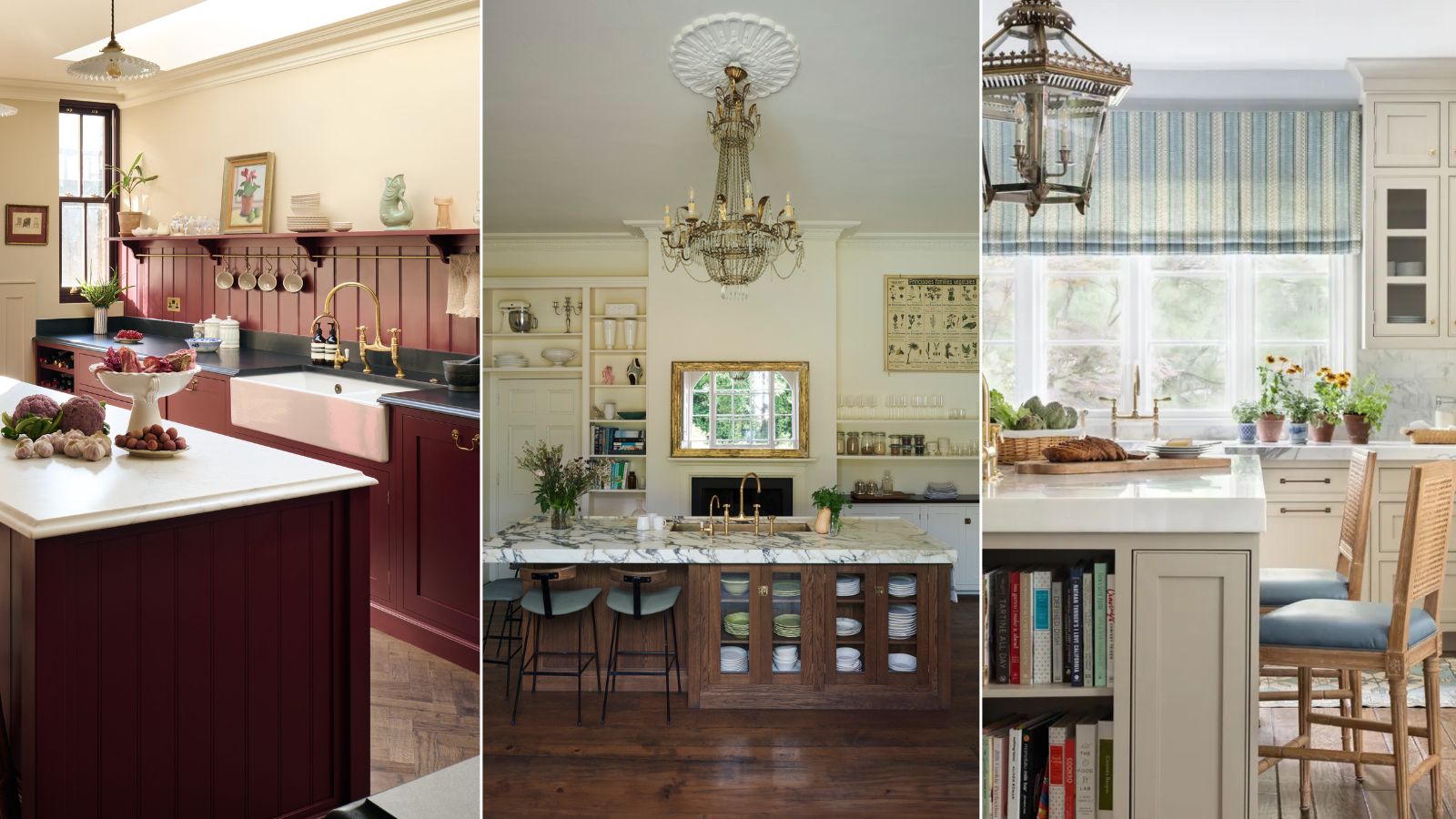
- 1. Mix and match storage and seating
- 2. Introduce a timeless countertop
- 3. Add a prep sink
- 4. Embrace the trend for dark red
- 5. Add homey appeal with a bookshelf
- 6. Soften the space with a fluted kitchen island
- 7. Introduce split level seating
- 8. Hide outlets in a kitchen island
- 9. Add a sense of luxury with a marble waterfall edge
- 10. Show off an island with statement lighting
- 11. Double the seating with an L-shaped breakfast bar
- 12. Add two islands to divide the space
- 13. Be bold with your material choices
- 14. Add open shelving to an island for display pieces
- 15. Try a T-shaped island for an interesting spin
- 16. Think carefully about walkaround space
- 17. Pair a wooden island with painted cabinets
- 18. Create a multi-functional island
- 19. Add vibrant color with a kitchen island
- 20. Add a designated wine cabinet
- 21. Add texture with paneling
- 22. Use a floating effect for extra interest
- 23. Add tiles to a kitchen island
- 24. Work with your home's existing fabric
- 25. Lean into a moody scheme
- 26. Introduce a butchers block island
Design expertise in your inbox – from inspiring decorating ideas and beautiful celebrity homes to practical gardening advice and shopping round-ups.
You are now subscribed
Your newsletter sign-up was successful
Want to add more newsletters?

Twice a week
Homes&Gardens
The ultimate interior design resource from the world's leading experts - discover inspiring decorating ideas, color scheming know-how, garden inspiration and shopping expertise.

Once a week
In The Loop from Next In Design
Members of the Next in Design Circle will receive In the Loop, our weekly email filled with trade news, names to know and spotlight moments. Together we’re building a brighter design future.

Twice a week
Cucina
Whether you’re passionate about hosting exquisite dinners, experimenting with culinary trends, or perfecting your kitchen's design with timeless elegance and innovative functionality, this newsletter is here to inspire
The best kitchen island ideas are the perfect balance of aesthetics and practicality. They need to get the job done – adding extra storage and surface space – but they also need to look wonderful, they are the focal point of any kitchen after all.
Nowadays, an island is considered an essential in kitchen ideas, whether you introduce something small and space saving or a double island to fill a large room. The good news is, there are plenty of ideas to make your kitchen island the focal point of a room no matter the size or style.
So, whether you're designing a kitchen with an island dedicated to cooking, hosting friends and family, or creating a multi-functional zone, these expert tips and ideas are a wonderful place to start.
28 kitchen island ideas
These kitchen island ideas will help to inspire your choice of size, shape, finish, and design, as well as island seating ideas and kitchen island layout ideas, to create a new addition that will completely transform your cooking space.
1. Mix and match storage and seating
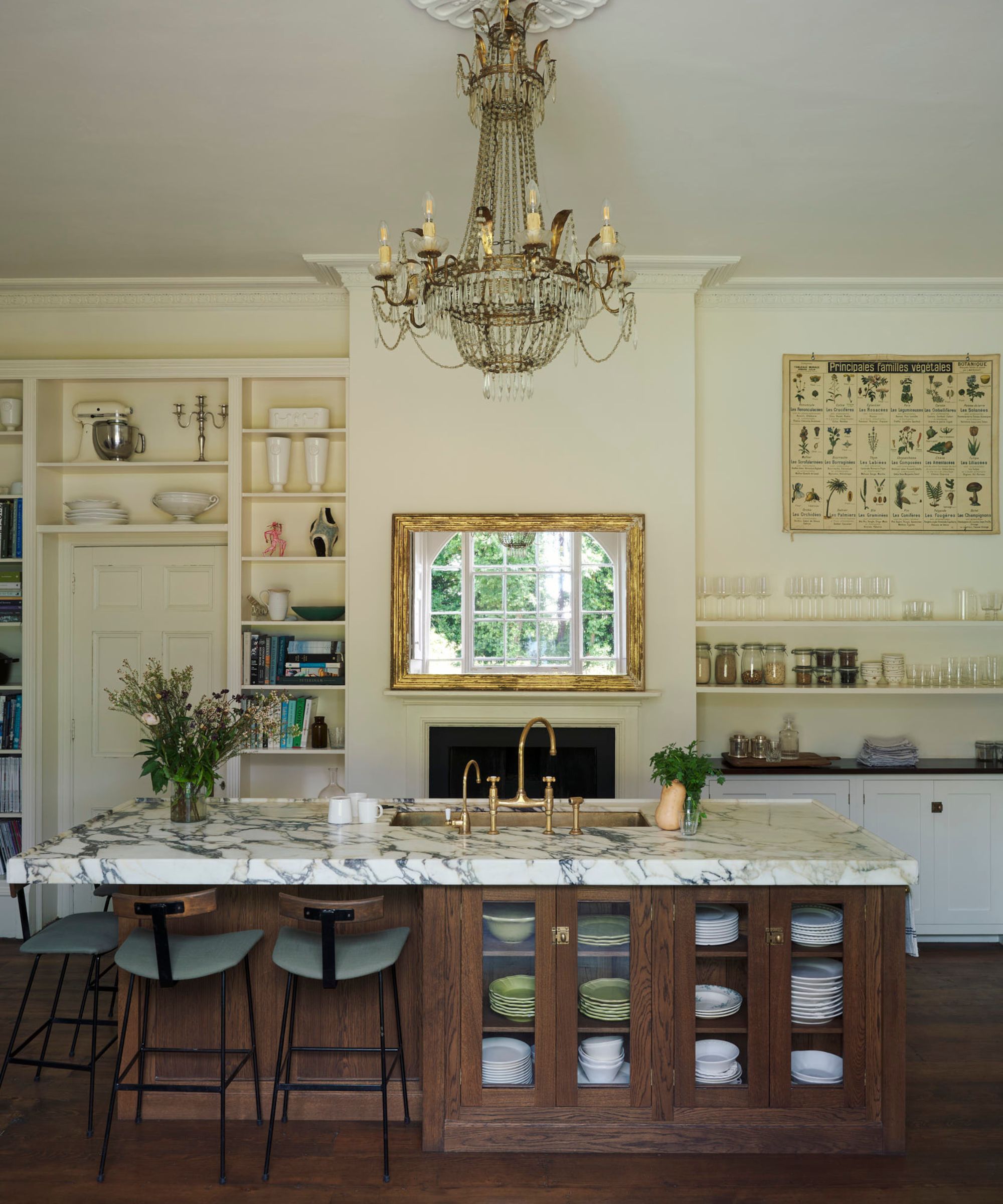
'Seating is so popular around an island, this can be created by simply extending your worktop to allow a few stools to slide underneath or it can be incorporated into the structure of the island, making it more permanent and integrated,' explains Helen Parker, Creative Director of deVOL.
'Sitting up at an island is one of the many joys of a deVOL kitchen, whether it’s a quick perch for breakfast or a regular homework destination with the draw of after school snacks included!'
2. Introduce a timeless countertop
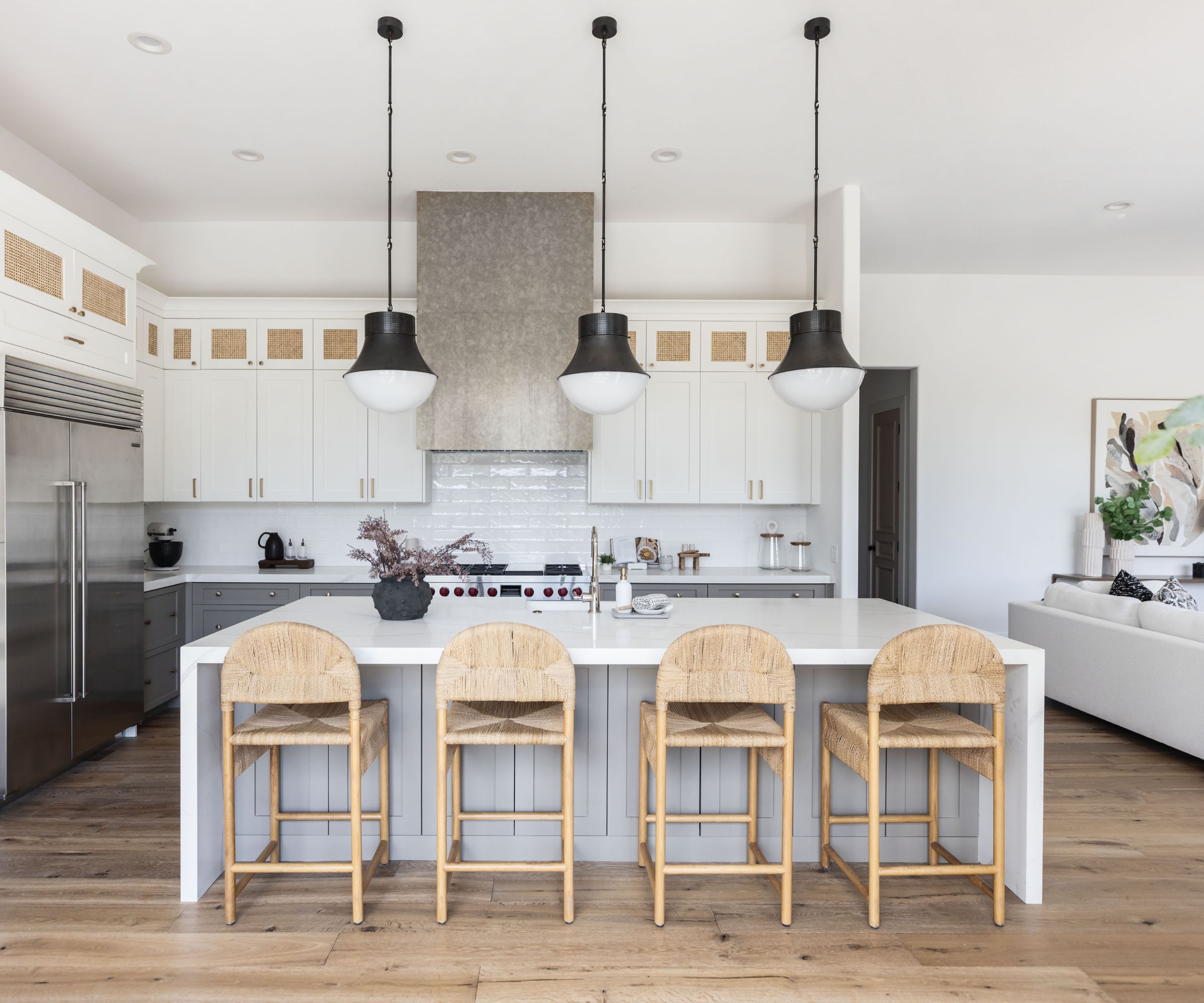
Often the largest and most used surface in your kitchen, the materials you introduce to your island must be as durable and timeless as they are visually interesting. As such, choosing a countertop material that strikes this balance is key.
Design expertise in your inbox – from inspiring decorating ideas and beautiful celebrity homes to practical gardening advice and shopping round-ups.
'Selecting durable and stylish materials, like natural stone or engineered quartz, ensures that the island remains a stunning centerpiece that withstands the test of time,' says Lauren Lerner, CEO and founder of Living with Lolo.
'Opting for durable and stylish materials guarantees that the island remains an attractive and enduring feature in the kitchen, enhancing the overall design and value of the home,' she adds.
3. Add a prep sink
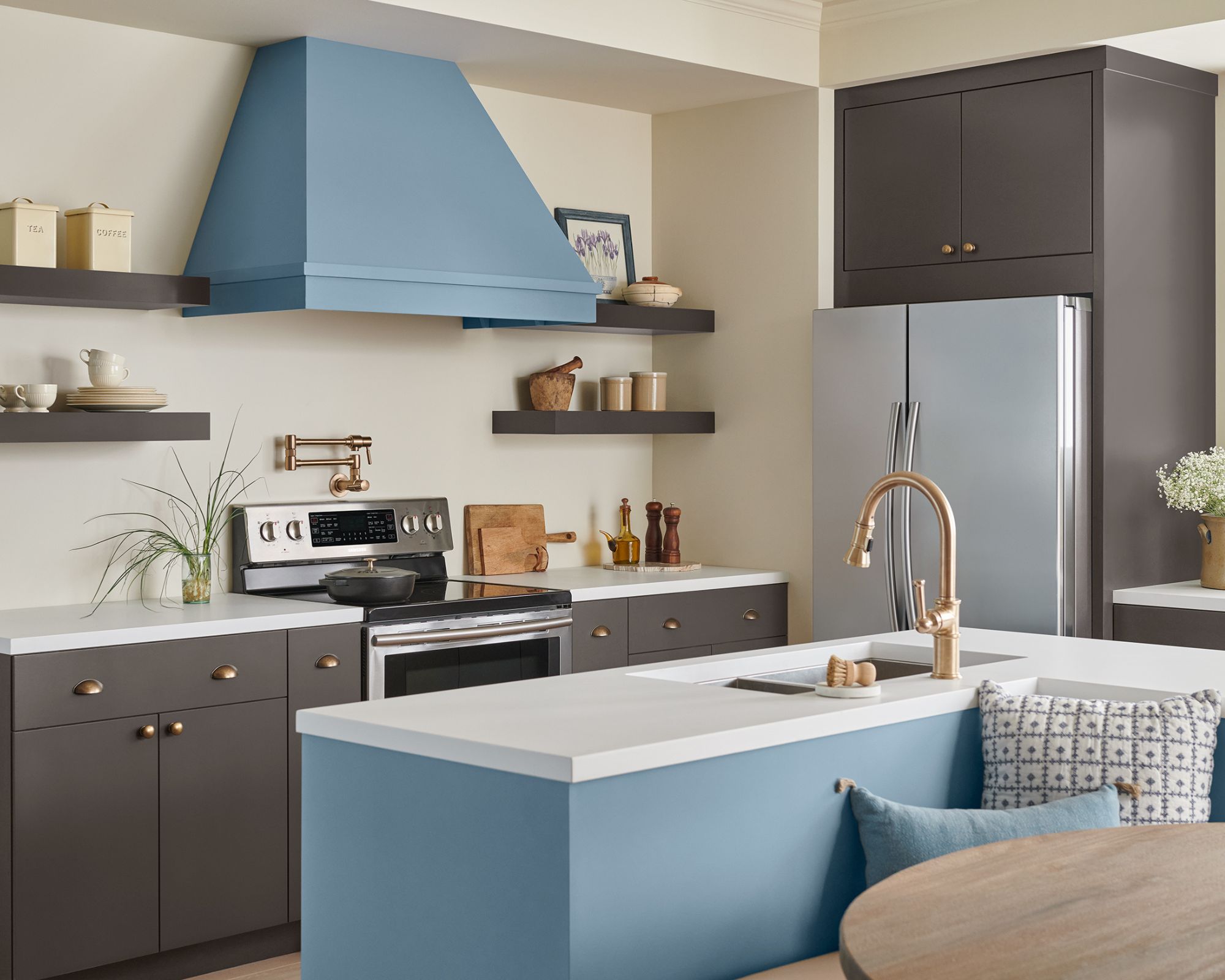
A kitchen island can be an ideal space to introduce useful features, especially where food prep and cooking are involved. While most designers stay away from adding a cooktop to an island, introducing a second sink works really well.
'If room allows, a second prep sink can also look elegant on an island. I wouldn’t want my dirty dishes and dishwashing to be the main focal point of an island, but there is usually a special place for that in kitchens with butler’s pantries or dirty kitchens where the real dishwashing is done,' says Sondra Ganz, of Studio Ganz.
4. Embrace the trend for dark red
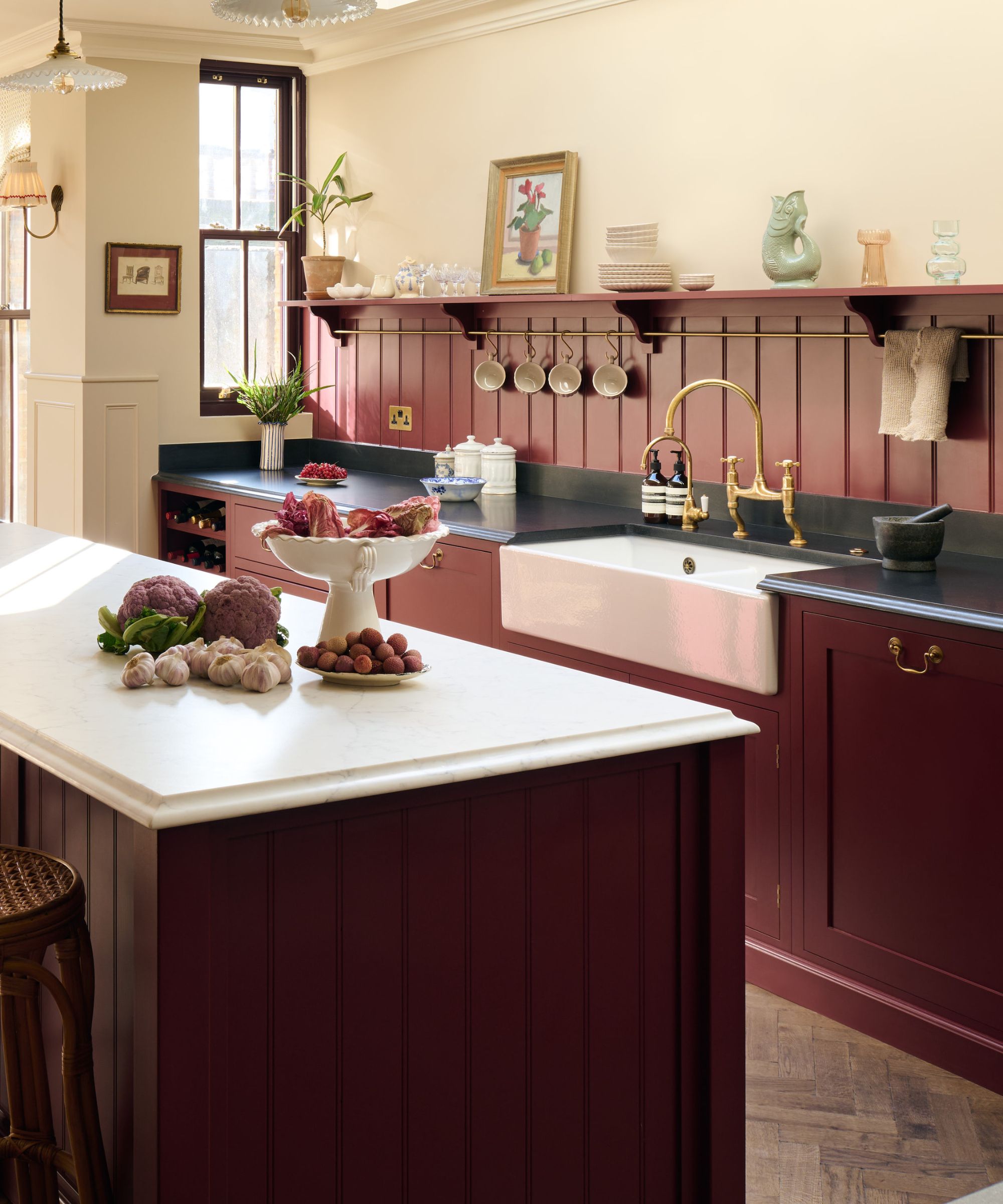
When it came to colors and kitchen island, the go to used to be a contrasting shade to make the island stand out. Play in it safe with the cabinets, go bold with the island. But now trends are encouraging us be bolder with kitchen colors, the island no longer needs to be a feature and the whole kitchen can embrace a braver hue.
Red kitchens are the top of trends for 2025, specifically dark rich reds as seen in this space. 'Our Shaker shade, Refectory Red, is a very traditional colour that was very often used in country house kitchens, this rich deep red works anywhere and has the ability to make a piece of furniture instantly feel grand and smart. Mix with black granite or slate for a truly authentic look,' explains Helen.
5. Add homey appeal with a bookshelf
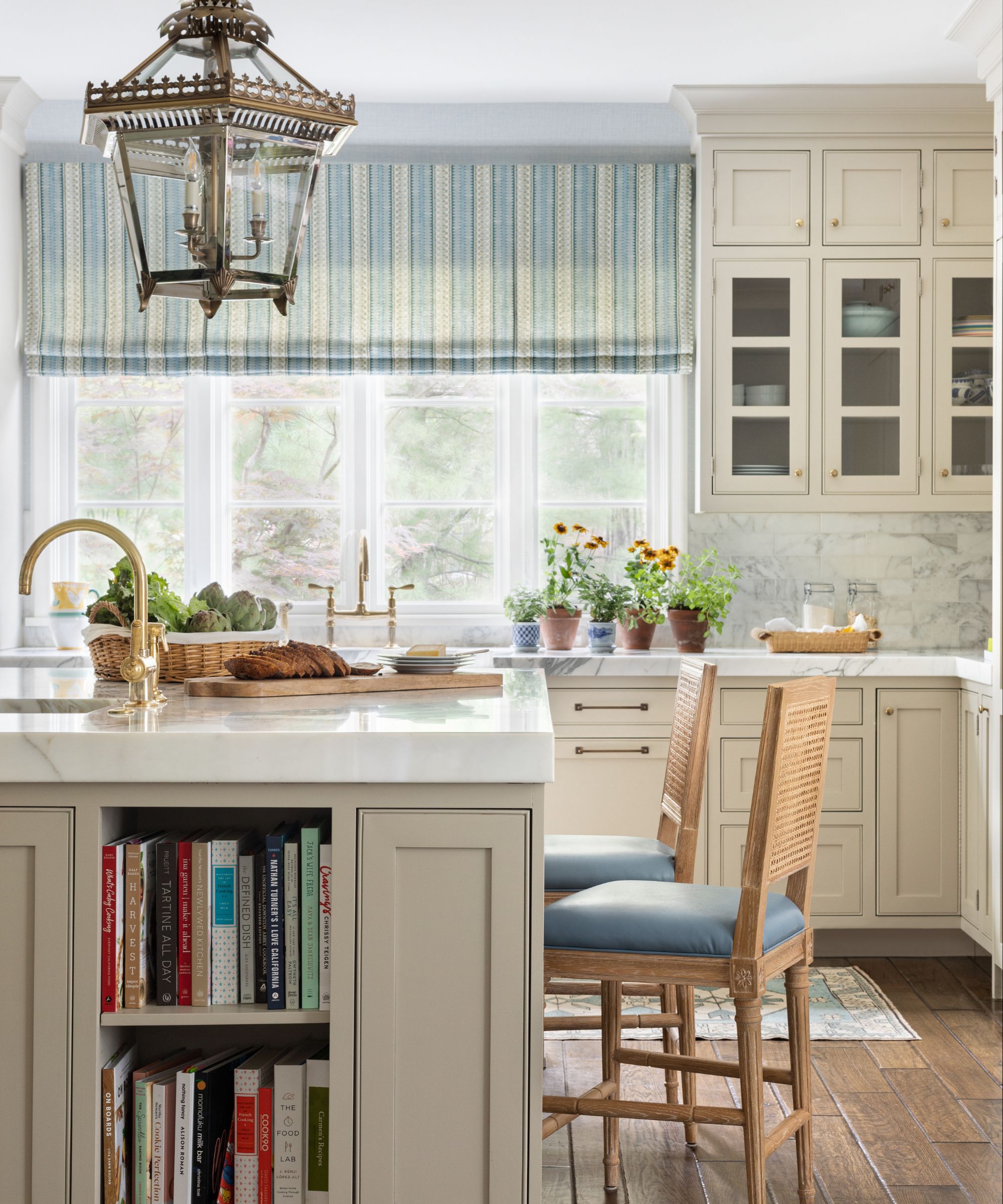
Now more than ever we're searching for ways to add a cozy touch to our homes, especially the kitchen. As these spaces become more than just a space to cook in, introducing decor and belongings that bring us joy is key to making kitchens feel as homey as other rooms.
One such way to do this is to introduce a bookshelf, and your kitchen island is the perfect place for it. whether you add shelving along one side of the island, or utilize a cupboard as open shelving.
A narrow section of this kitchen island has been turned into a small bookshelf, housing a selection of cookbooks and novels. Storing and displaying them here adds interest to the space, as well as making them easily accessible.
6. Soften the space with a fluted kitchen island
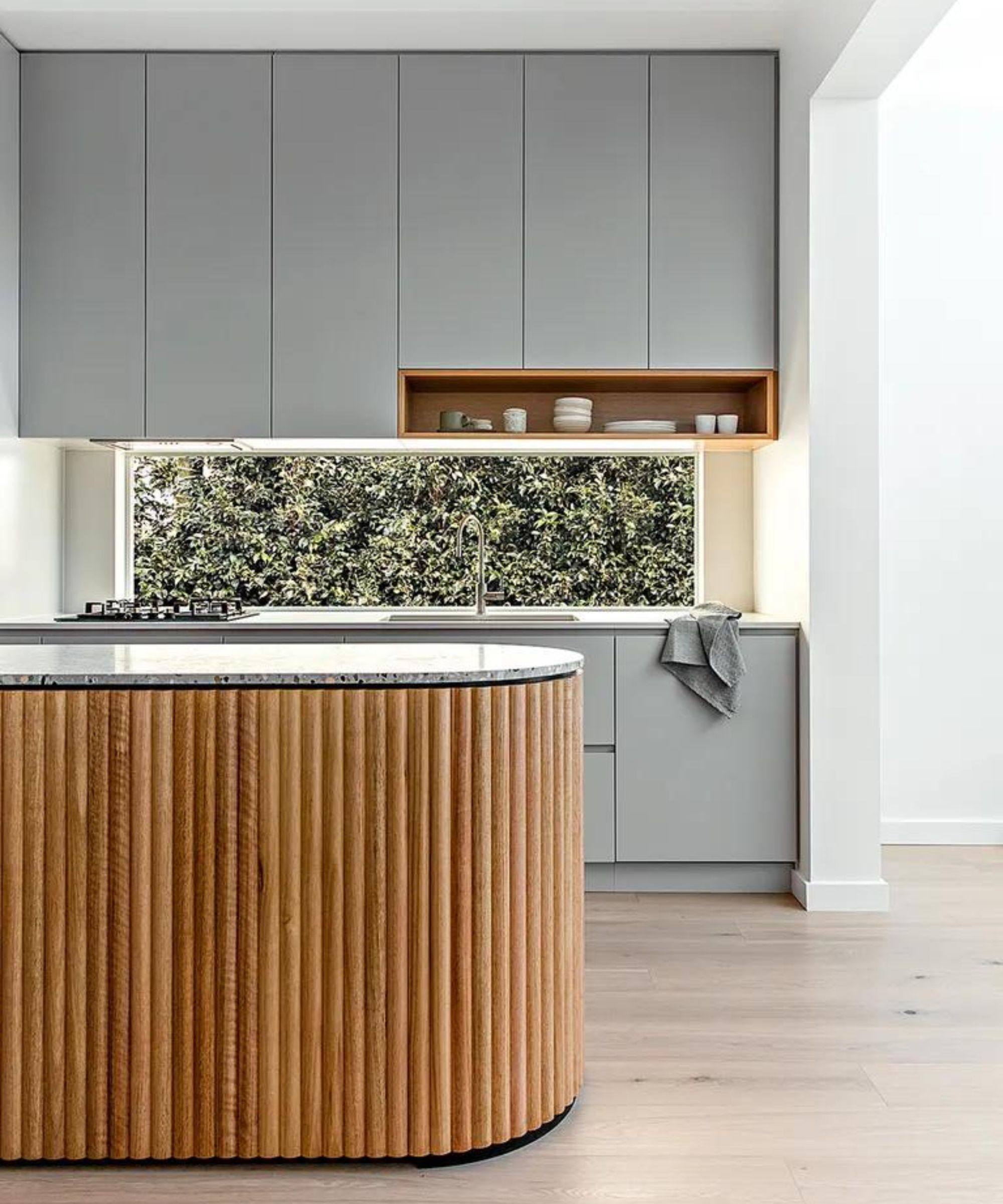
Fluting around a kitchen island can be far more than just a decorative surface. In this relatively narrow kitchen by Australia-based Kitty Lee Architecture, ease of movement around the island was crucial, and fluting served a practical purpose.
‘The fluted detail allowed us to create a beautiful feature around a curved form, adding texture, warmth, and contrast to the space, while also improving the traffic flow and ergonomics,’ says director, Kitty Lee. It was created using individual 30mm-wide half-round dowels in Tasmanian oak, a dense and resilient hardwood with excellent staining qualities.
Not only does the curved profile create a better flow around the kitchen island, but it also softens a space that naturally features a lot of hard, straight edges. Paired with the fluted detail, the overall effect is warm and inviting.
7. Introduce split level seating
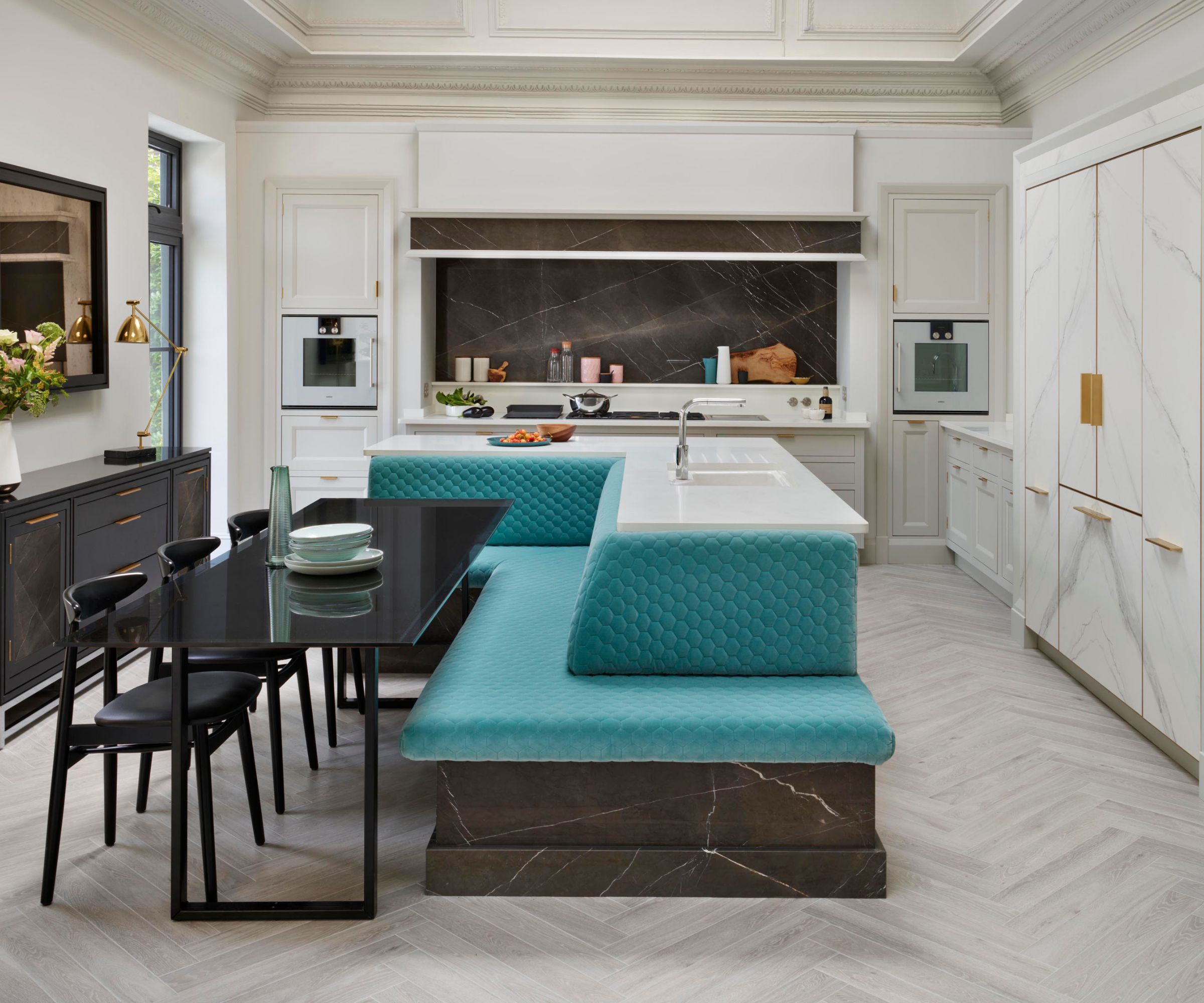
As well as extra workspace, one of the top modern kitchen island ideas right now is the addition of a dining table for a clever space-saving solution.
Richard Atkins, design director at DesignSpace London, says: 'A decade ago, islands were generally only one height: either worktop height or a higher bar level. Now there is much more variation, with different levels for different functions.
'We regularly integrate a table into the island, due to two main reasons: when a living space is more compact and there isn’t the space for a separate dining table, or when clients actively want to eat in close proximity to the kitchen,' he adds.
8. Hide outlets in a kitchen island
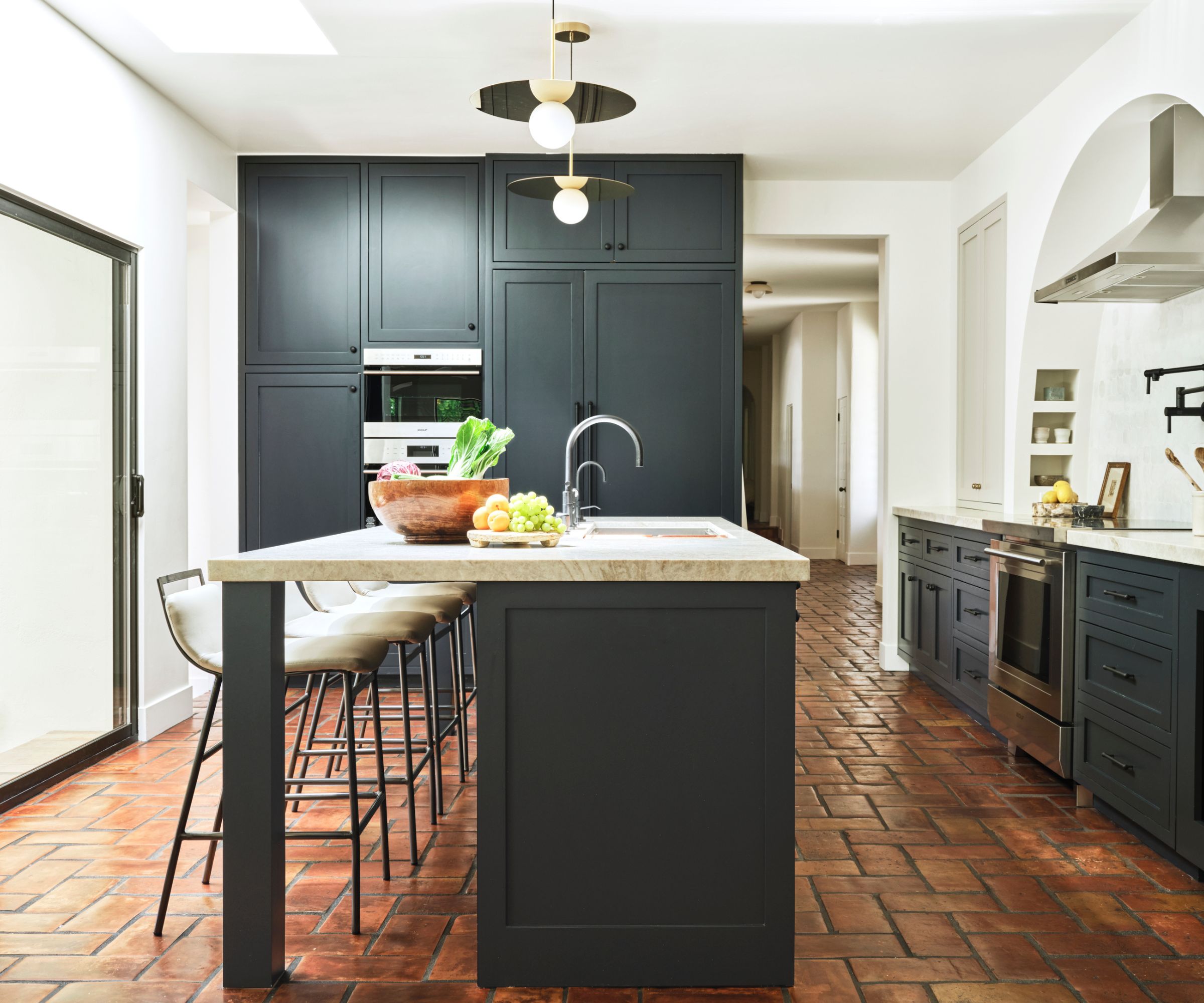
A kitchen island offers plenty of smart solutions for hiding the more unsightly features that are essential in a kitchen but can often be a bit of an eyesore. One such feature is outlets, which can easily be hidden within your island design.
'Concealed outlets under the seating overhang are a must,' says Sondra. This is a handy place to locate them – anyone sat around the island can charge their phone or laptop, and they're still within close reach to plug in appliances.
And, or course, it keeps the outlets out of sight, so you don't have to worry about them ruining your scheme!
9. Add a sense of luxury with a marble waterfall edge
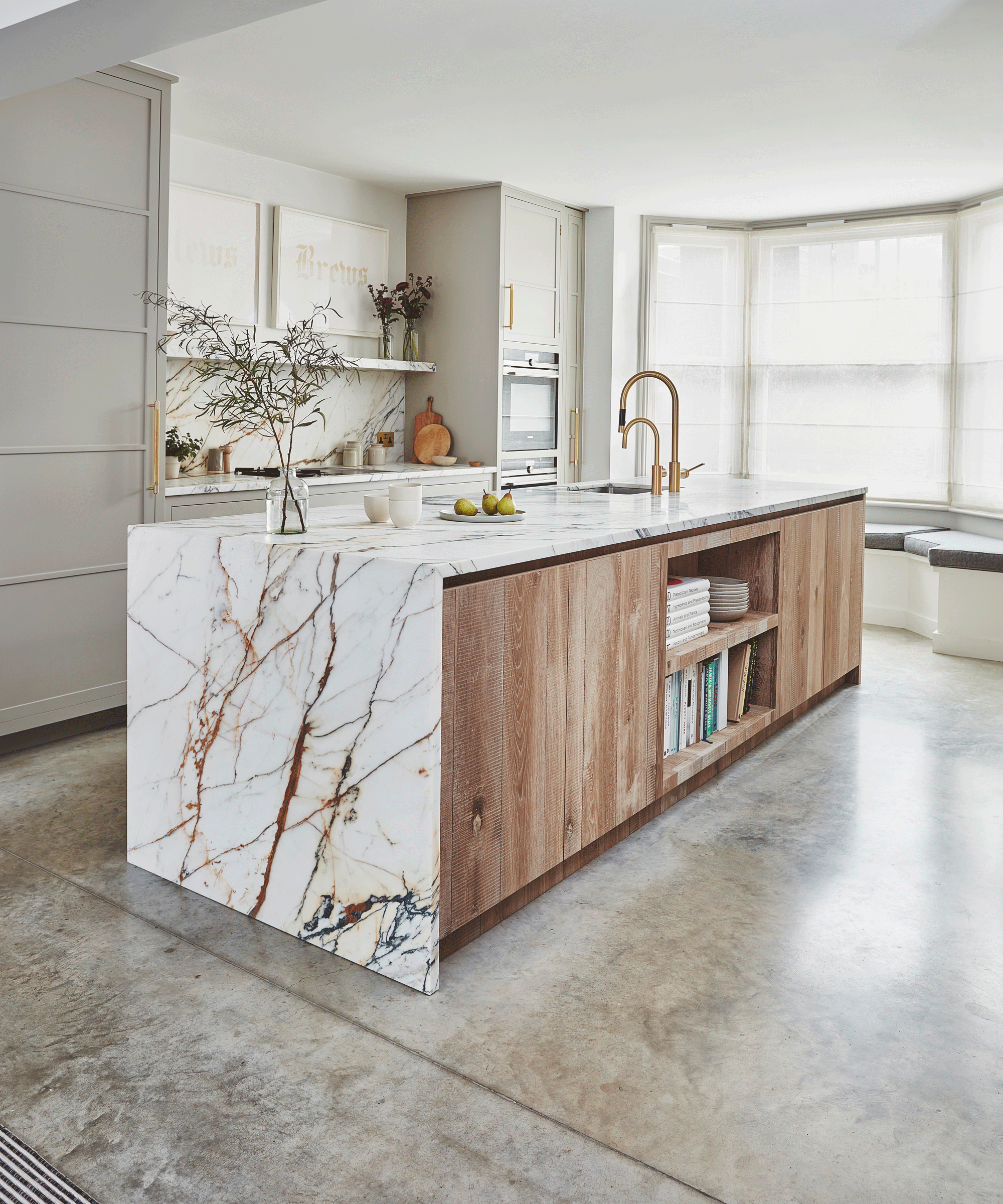
If you're looking to add a sense of luxury to your kitchen design, try introducing a waterfall edge to your kitchen island. This continuous flow of the countertop to the floor not only looks clean and cohesive, but it elevates the finished design, especially when the right stone is chosen.
‘Deeply veined marbles look particularly fabulous using this technique, especially if you source a slab large enough to allow the veining to flow right down to the floor,’ says Oana Sandu, lead designer at Blakes London.
If you do choose to introduce this design element, make sure you consider your flooring choices. ‘It’s important to think about the flooring and how it will complement your choice of worktop. Usually, a contrast works best,' Oana adds. If you opt for a lighter finish on the waterfall edge, consider darker flooring to allow the island to become the focal point.
10. Show off an island with statement lighting
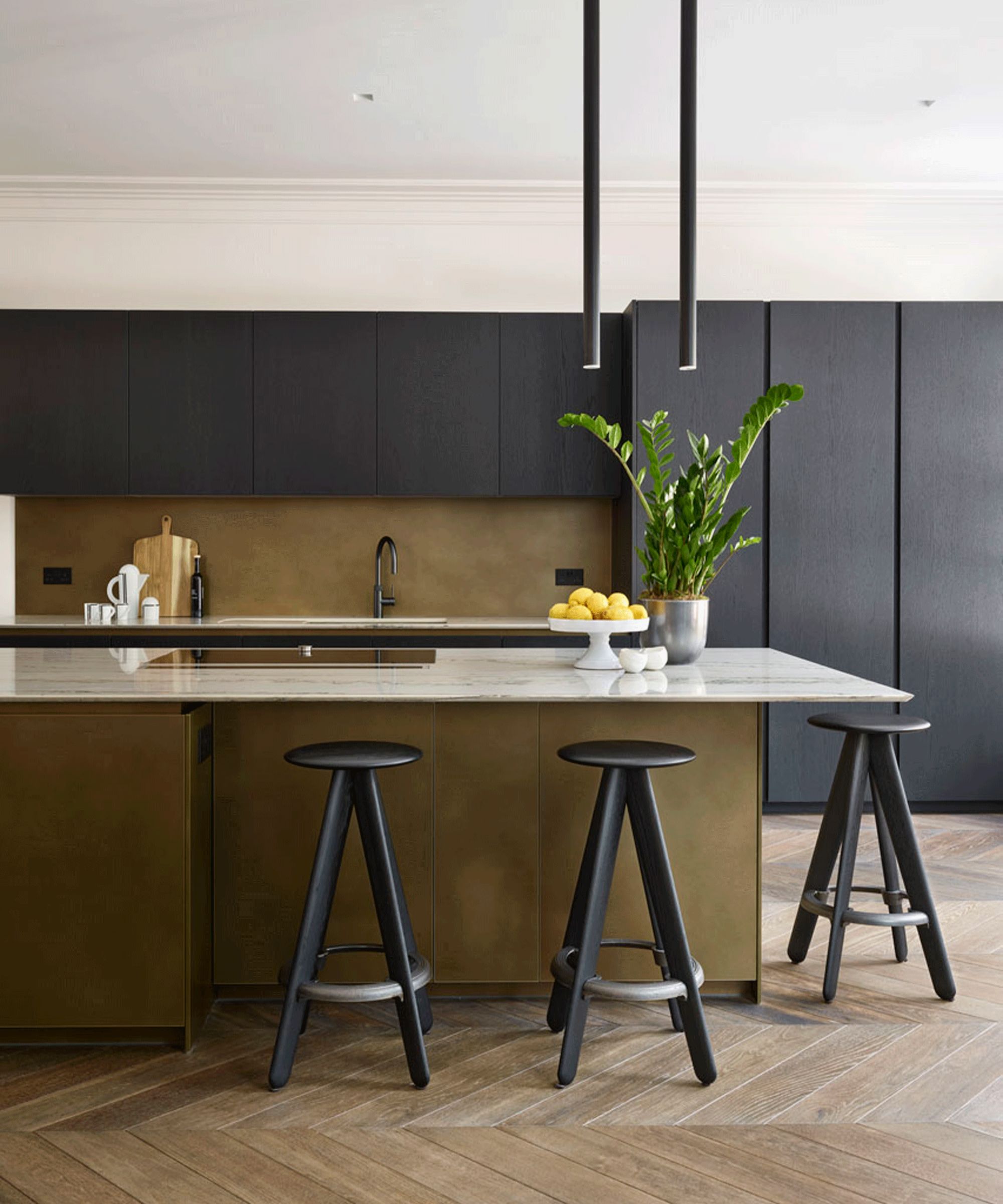
Kitchen island lighting can make all the difference – practically, you need good lighting to make the kitchen island useable, and stylistically, the lighting chosen can really tie the scheme together. To put your kitchen island in the spotlight, opt for statement lighting in the form of pendant lights.
‘Characterful, statement lighting should enhance the drama in the kitchen – not steal the show,’ says Richard Atkins, design director at DesignSpace London. Iconic shapes with revered design heritage are likely to outlast trendy fittings, while swerving standard pendant lineups in favor of off-set positioning is a simple move with impressive results as part of breakfast bar ideas.
In this kitchen design, contemporary light fixtures have been added to compliment the bar stools and cabinetry – these darker colors make the green woodwork and white marble of the island become the statement piece in the kitchen.
11. Double the seating with an L-shaped breakfast bar
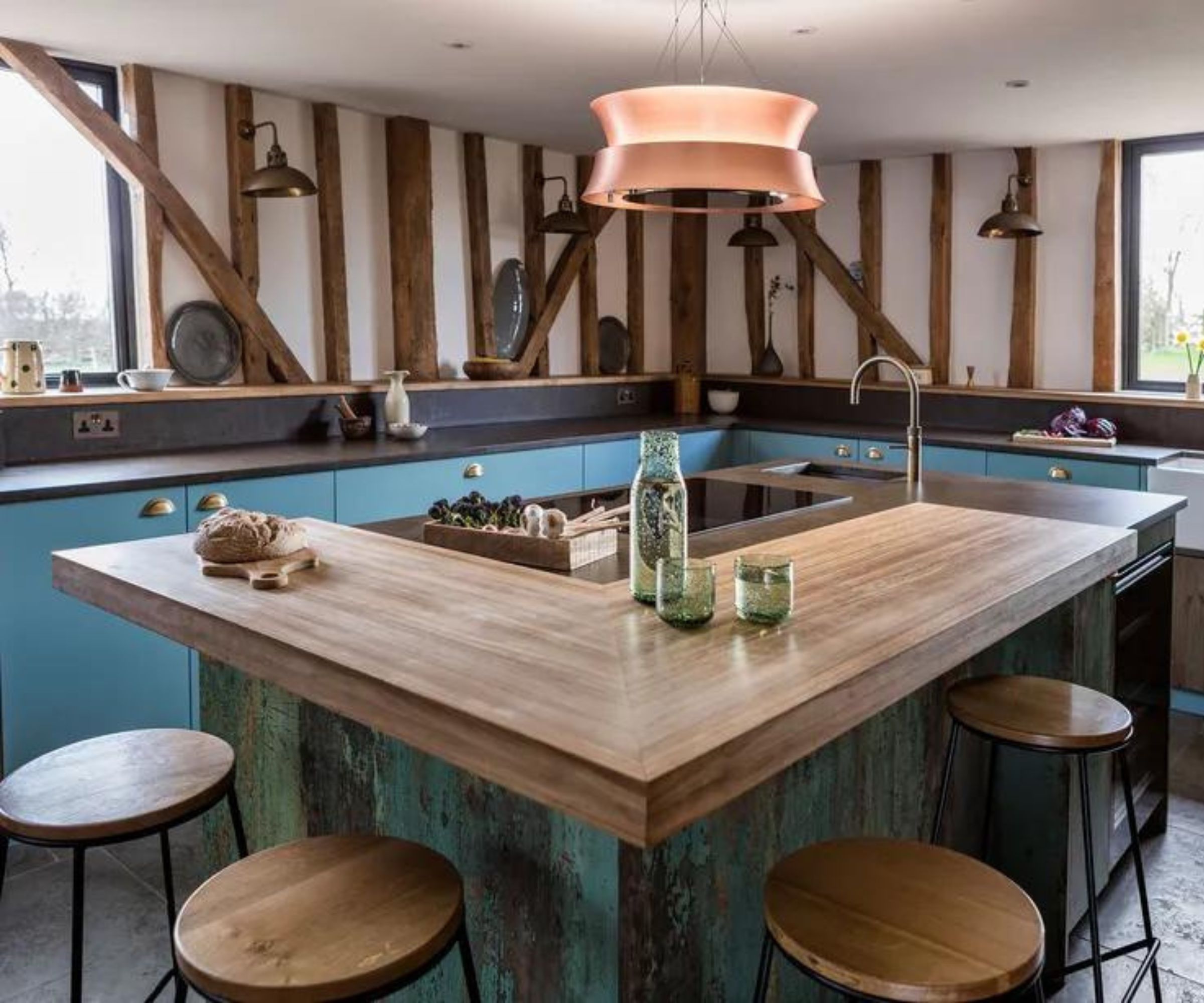
You've probably seen a fair few L-shaped kitchen ideas, but did you know the format typically used with cabinets can work really well for an island?
Creating an L-shaped breakfast bar with your island can be a handy way of doubling the amount of kitchen island seating within the same kitchen island size and creating a sociable cooking space.
It also makes serving food and drinks easier, so this design is perfect for those who love to entertain. This design also works well for farmhouse kitchen island ideas, as it adds the sociability that defines this style of kitchen.
12. Add two islands to divide the space
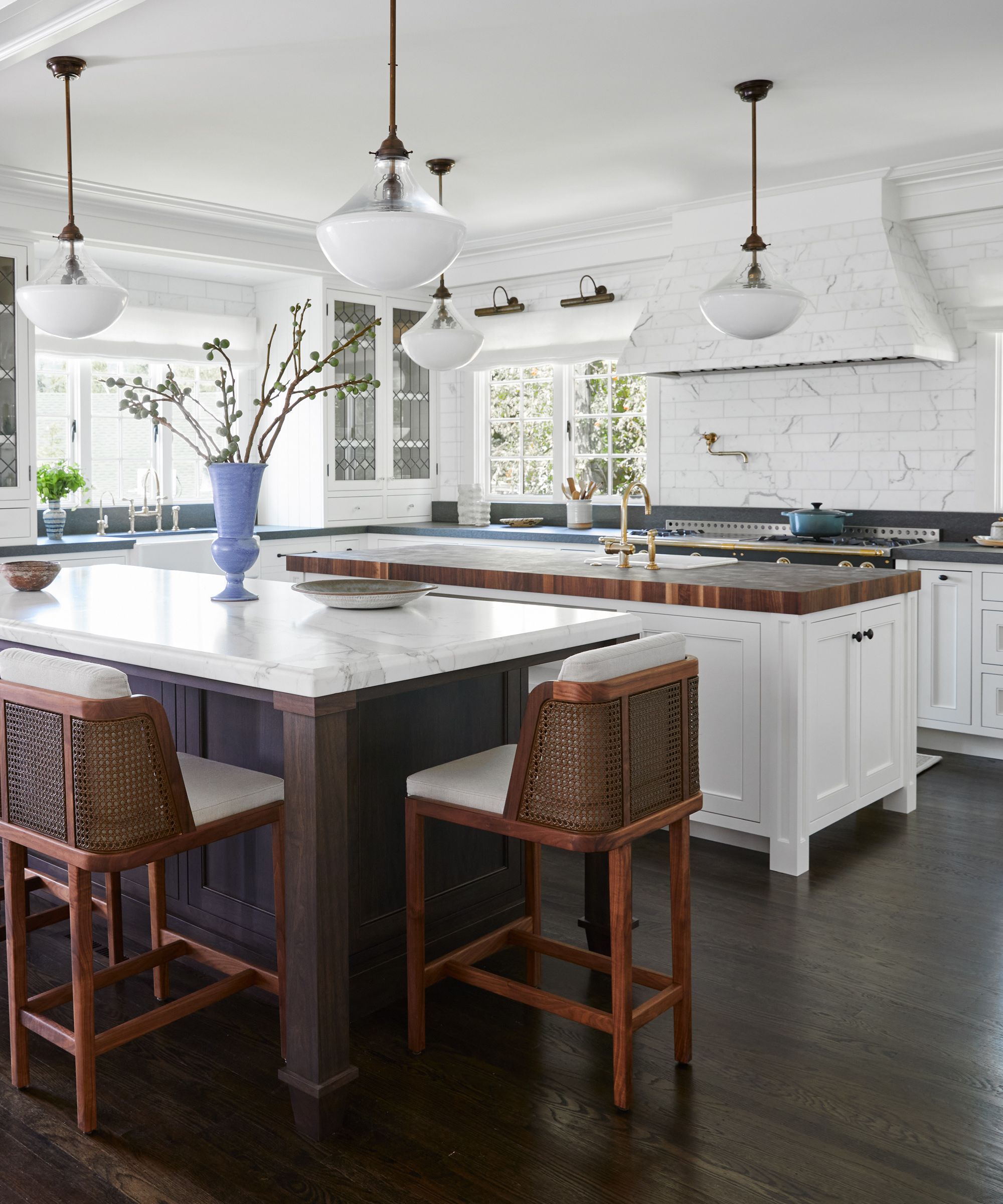
From a functional perspective, a kitchen island provides extra prep space, cutting down the footwork between key areas of sink, cooker and fridge in an open plan kitchen. It also provides a boundary between the work zone of the kitchen and the neighboring living/dining zone, keeping children and guests from getting under your feet. It is increasingly a workspace, too.
'The rise of the "working kitchen" reflects a repurposing of the traditional kitchen and an increased demand for multi-functional spaces,' says Merlin Wright, Design Director at Plain English and British Standard by Plain English.
'Worktables offer added space and can include clever kitchen storage ideas to hide not only kitchen items but also office paraphernalia,' he adds. In this kitchen, two kitchen islands have been introduced – one for cooking and food prep, the other for dining and socializing. Double island kitchens are a great way to make the most of a large space and maximize storage.
13. Be bold with your material choices
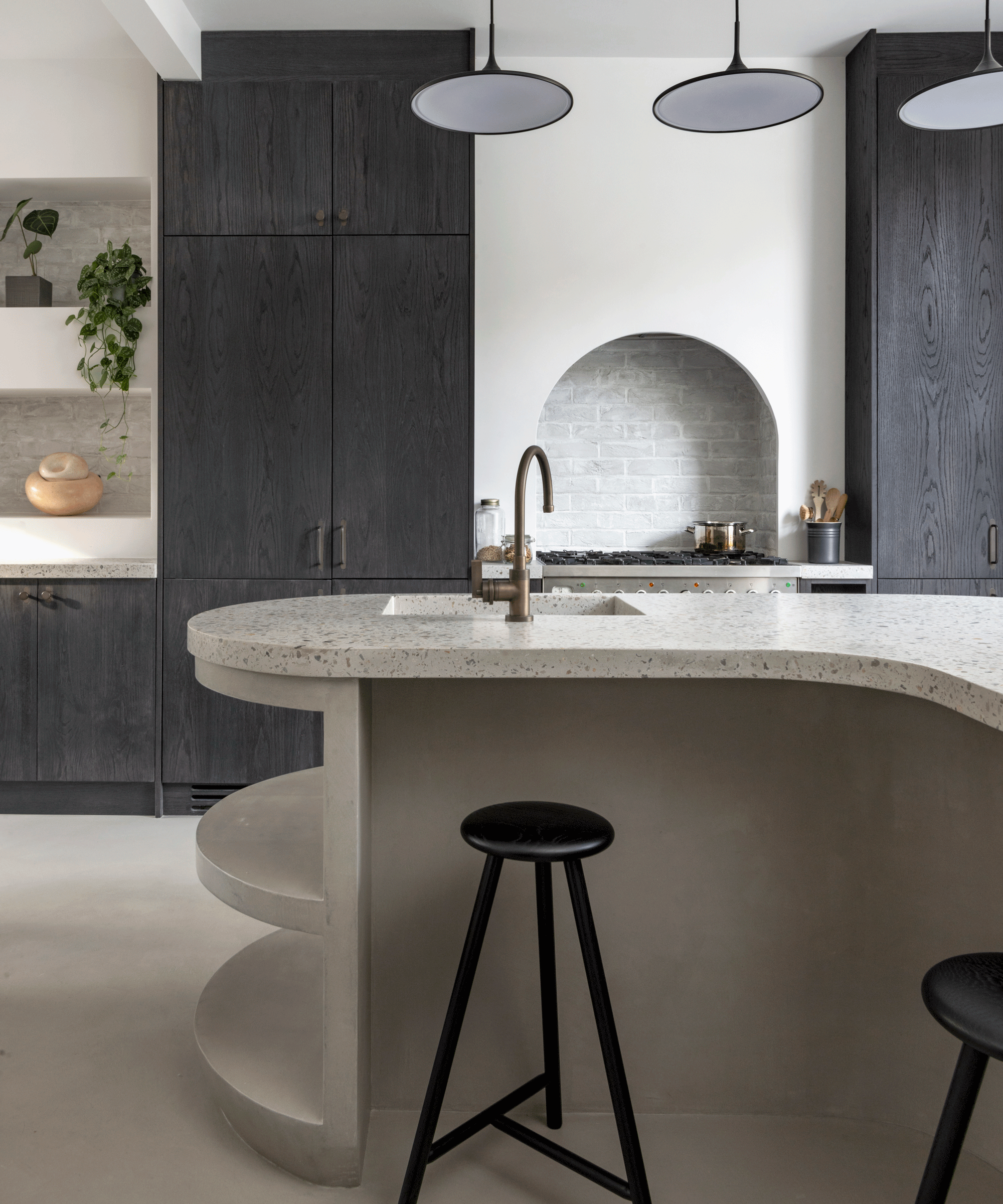
A kitchen island is a great place to experiment with materials and textures. Instead of opting for the same wooden cabinetry used around the rest of your kitchen, try introducing a bolder, unexpected material to contrast.
This concrete island, formed and cast on-site by Kote London, is a stand-out feature in an otherwise understated kitchen. ‘We wanted it to feel like a piece of art in the space,’ explains Stephen Nash, founder at All & Nxthing Interiors.
If you're going for a more paired-back, minimalistic kitchen scheme, form and texture are key to adding interest. ‘Rounding off all the corners improves functionality and flow, while helping to soften the look of what is actually a big and very practical island,’ he adds.
14. Add open shelving to an island for display pieces
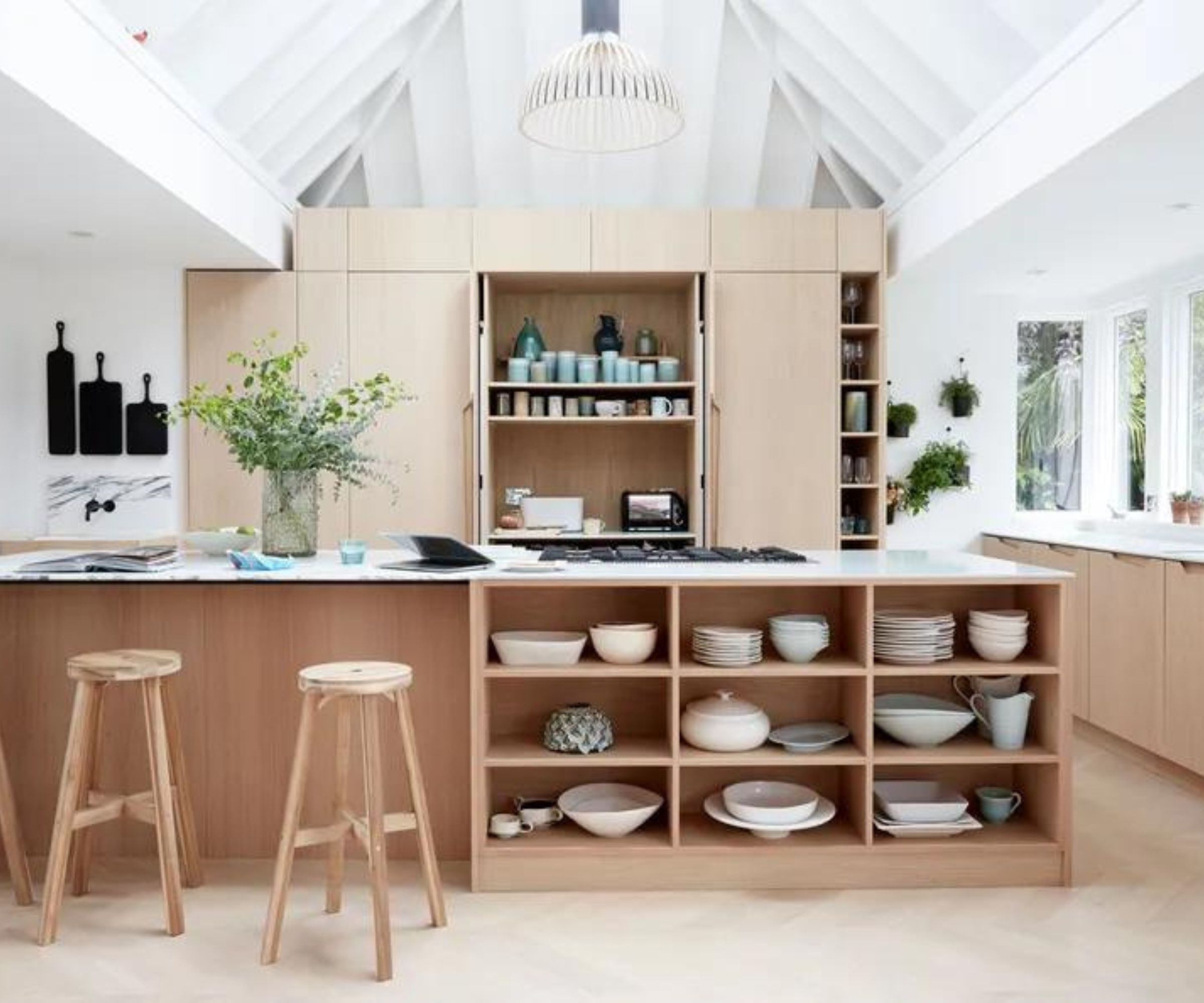
Kitchens are more than just spaces used for cooking and cleaning. And as we embrace these rooms as a place to relax and socialize, designers are looking to the kitchen island to add more decorative additions. Open shelving in a kitchen island is one such example, offering an extra space for displaying decor and aesthetic tableware.
'No longer content with pure practicality, clients are incorporating open kitchen shelving ideas within islands to act as beautiful displays, curated to showcase unique collections – from vintage curiosities and ceramics, to cookery books and glassware – each adding color and personality,' explains Plain English's Merlin Wright.
Whether you display collected trinkets, stack your favorite cookbooks, or showcase your favorite ceramics, adding open shelving to a kitchen island instantly gives the scheme a more homely feel.
15. Try a T-shaped island for an interesting spin
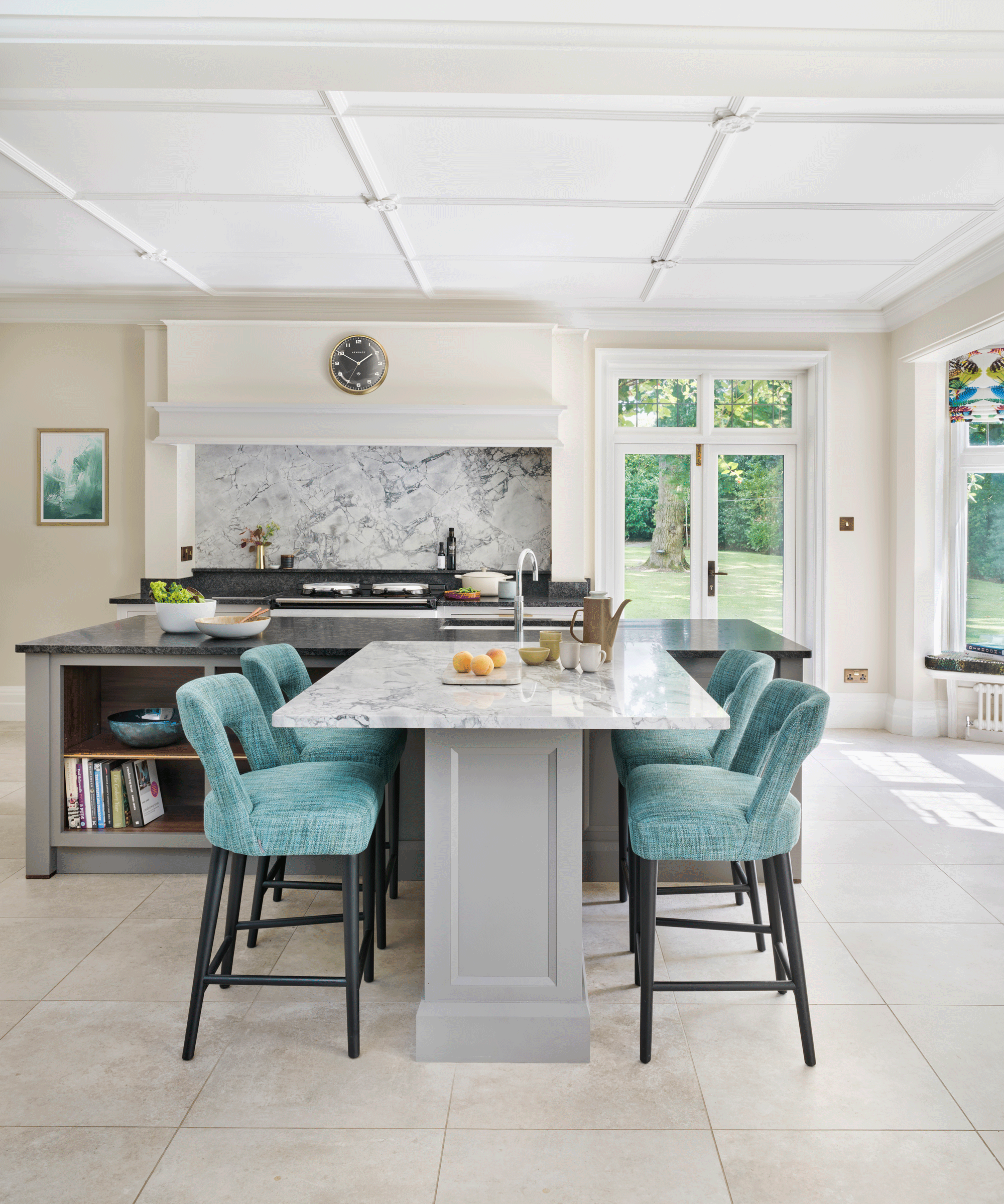
A T-shaped island can avoid one of the classic kitchen island mistakes of going too small in a large room and missing the opportunity to accommodate a host of activities at the heart of the room.
If you opt for this island layout, add a subtle contrast by choosing a different color and counter material for the seating area and the more practical island space. This creates clear zones within the space, without creating a divide.
To create the feeling of a dining table rather than a bar-style seating space, introduce upholstered bar stools with backrests for maximum comfort. In this kitchen, a blue fabric has been chosen, introducing a pop of color to the space.
16. Think carefully about walkaround space
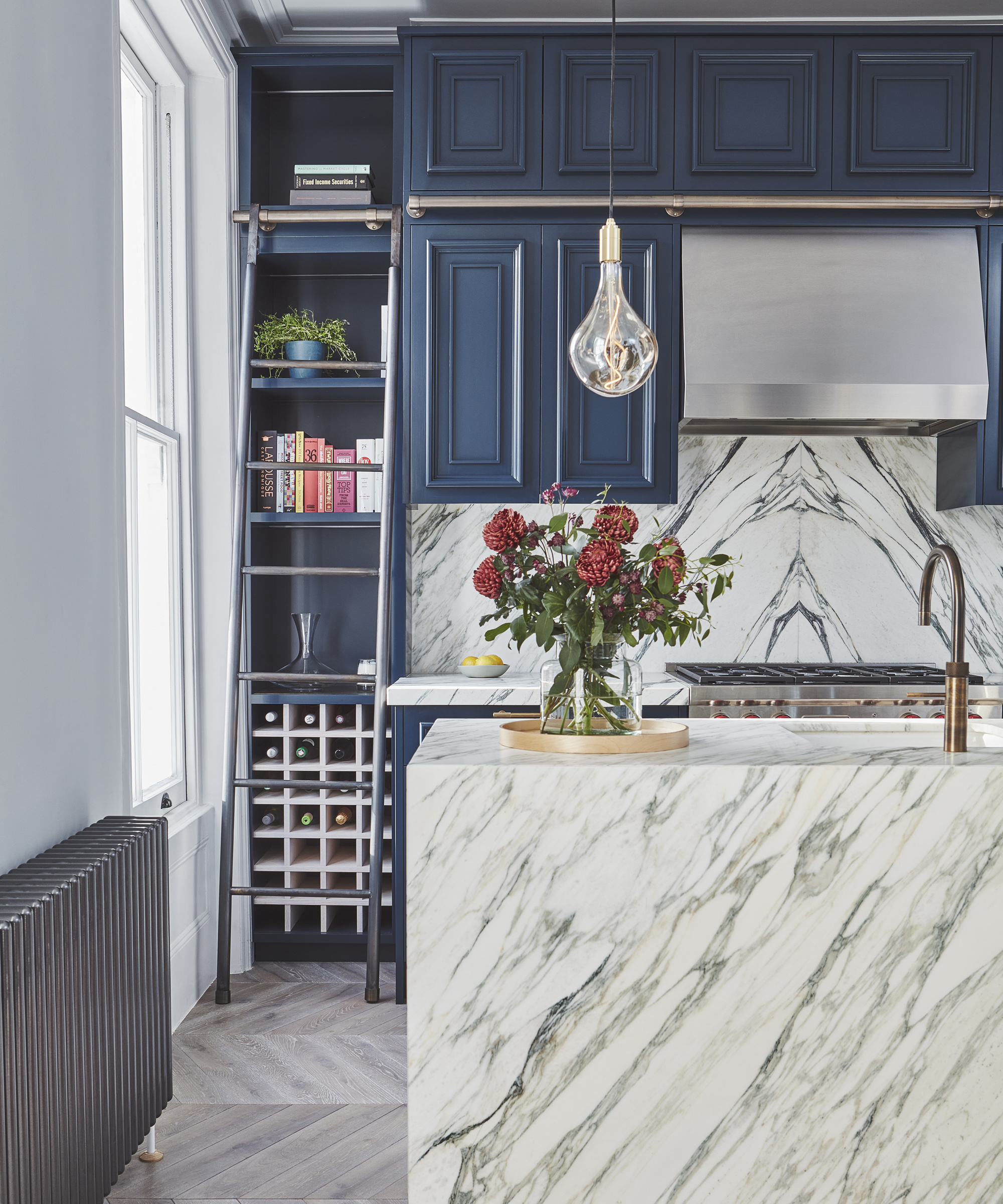
When designing your kitchen island, considering the amount of space you have around the island is just as important as the aesthetic choices. Practicality is key, so make sure your kitchen is still usable once the island is installed.
‘Islands are an eye-catching feature in a kitchen but they can eat up a substantial amount of space,’ says Graeme Smith. ‘So when thinking about adding one into the design, it is important to consider the available space and the circulation area around the island.
'Typically, 48in (1200mm) between the cabinetry and island will be needed for a scheme that invites an easy flow,’ he adds. In this compact kitchen, the island area is maximized but leaves just the right amount of space for users to move comfortably around its sides.
17. Pair a wooden island with painted cabinets
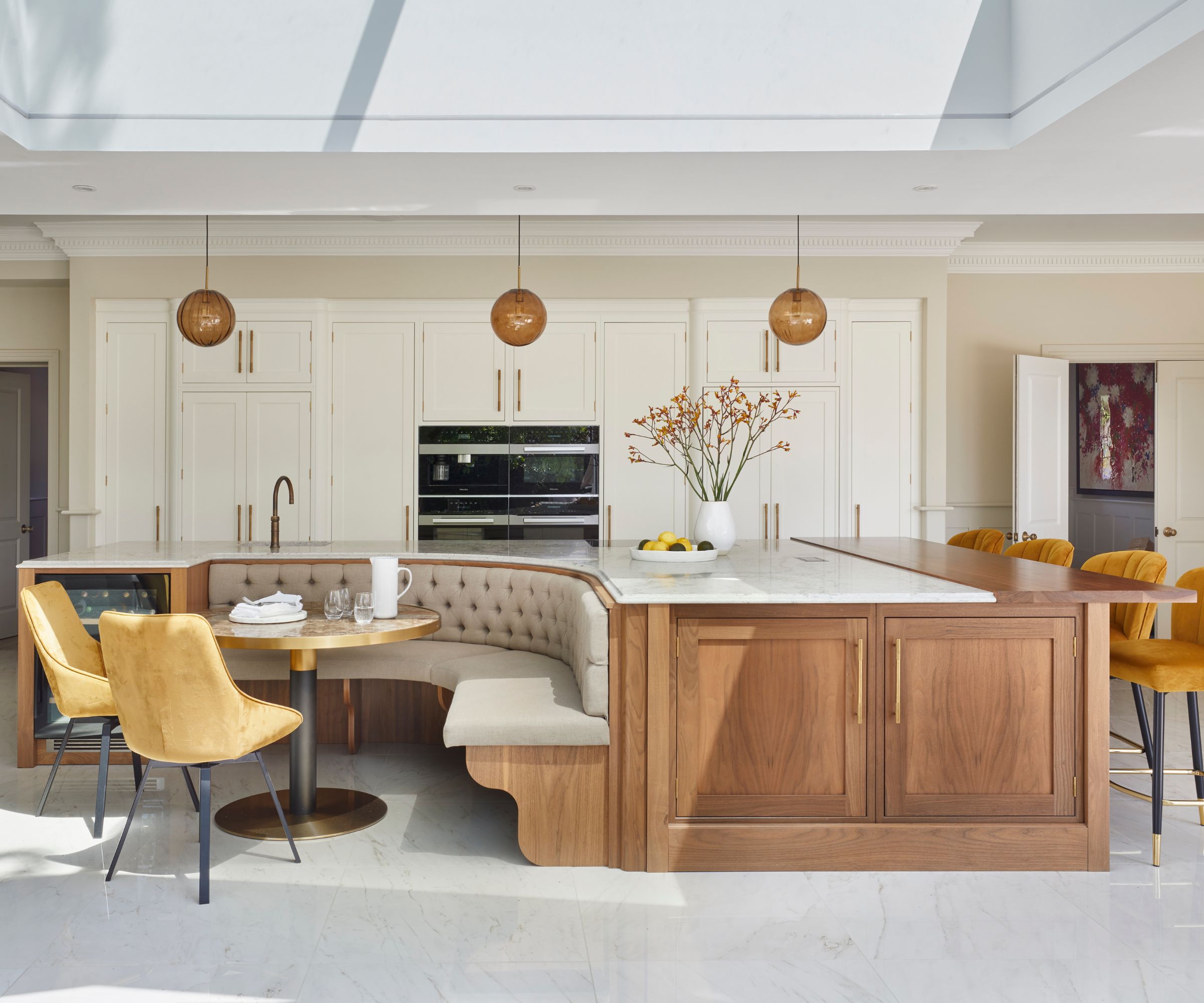
While painted kitchens have dominated kitchen trends in recent years, we are seeing a shift to more organic finishes. Introducing a wooden kitchen island is a great way to introduce a more rustic element to your kitchen scheme.
'Consider using wood as your material of choice for your kitchen island and contrasting it with the rest of the kitchen. Choosing this route instantly creates a statement and your kitchen island becomes the main centerpiece,' says Richard Davonport, managing director at Davonport.
'In this kitchen, the use of cream cabinetry behind the island is used as a canvas to offset the rich darkness of the wood. The overall style of the kitchen is resoundingly classic, with rich walnut accents and light hand-painted cabinets topped with a practical light stone worktop and paired with timeless brushed chrome handles – just beautiful,' he adds.
18. Create a multi-functional island
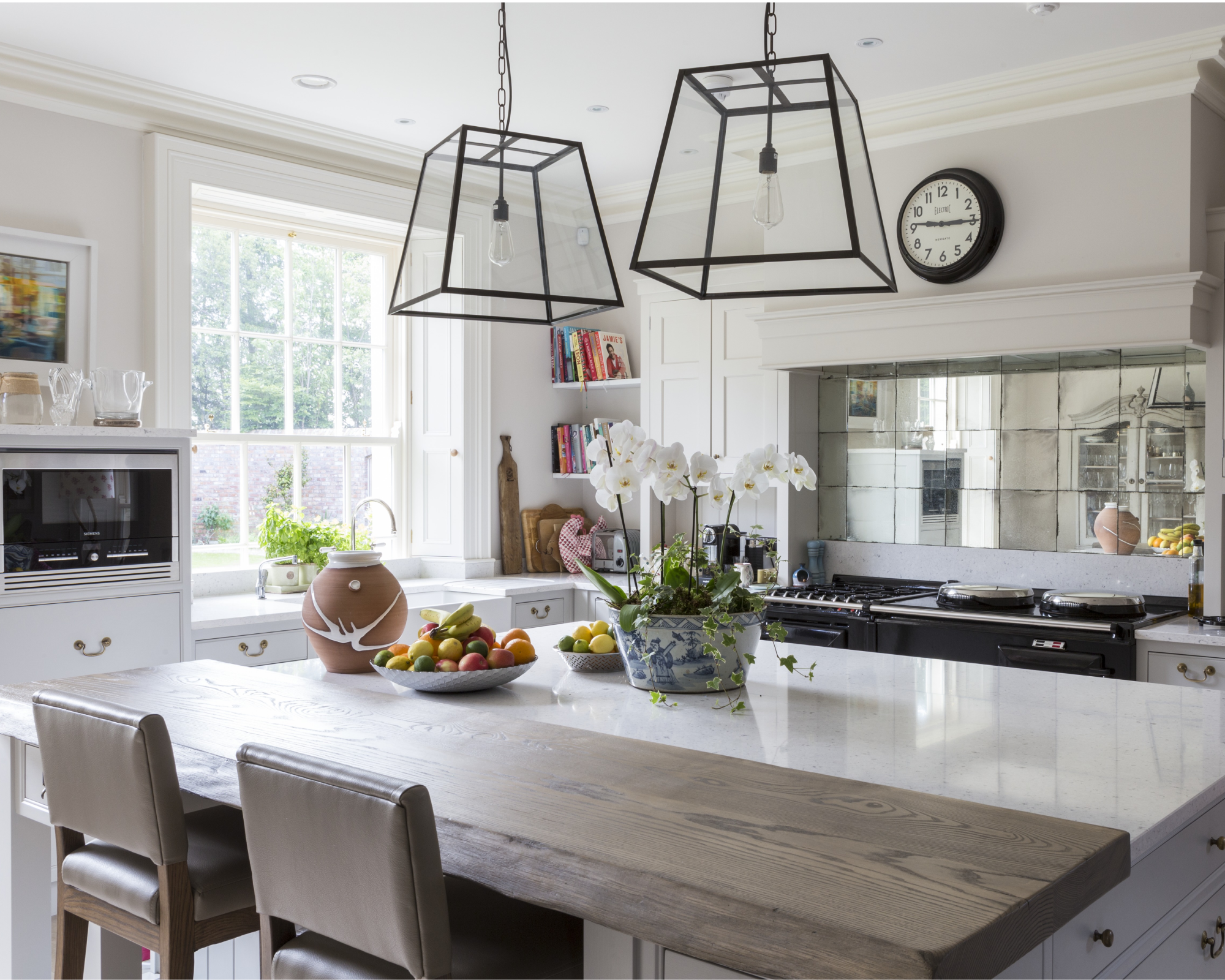
In most kitchens, there is only enough space for one kitchen island. As such, making sure it caters to multiple uses is key. To create a divide between cooking and socializing spaces, creating a visual divide ensures everyone feels like they have their own space.
Switching up materials on the surface is a fun way to break up a large kitchen island and create visual zones. For example, a surface used for food prep might be kept as stone, whereas wood might be used for breakfast bar ideas – like in this particular kitchen. This also gives the illusion of greater space!
If you love this neutral style, our white kitchen ideas will bring you more inspiration.
19. Add vibrant color with a kitchen island
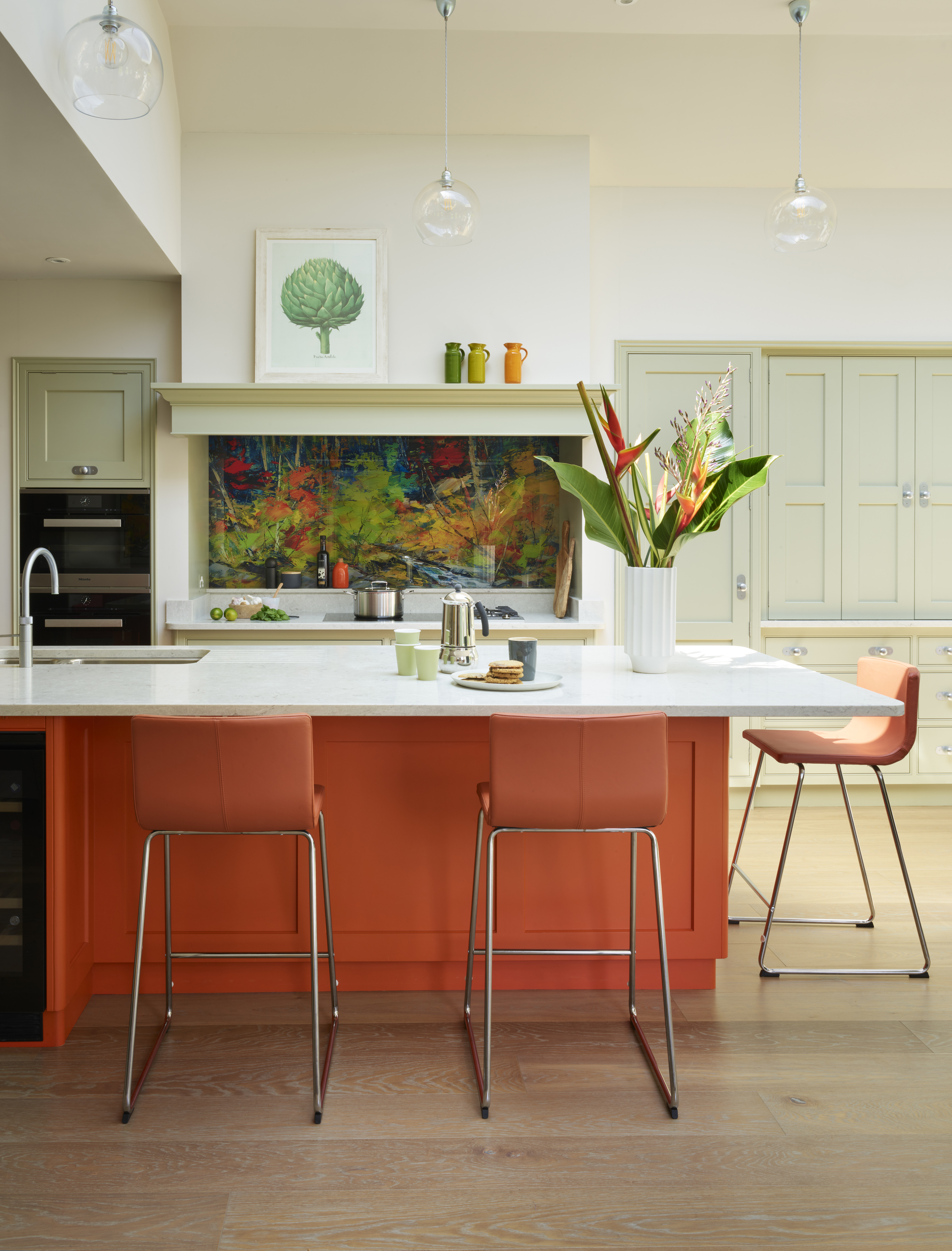
A kitchen island is a fabulous opportunity to incorporate fresh kitchen color ideas. It's a more subtle way to introduce a vibrant hue, but it instantly adds warmth and personality to the scheme.
'At least the facing part of the island should be covered in warm and welcoming materials to make a transition from efficient kitchen surfaces. For a show-stopping centerpiece, look to luxury materials as well as a contrast of color between the island and the rest of the kitchen,' says Laurence Pidgeon, director at Laurence Pidgeon.
In this kitchen, white and pale green are used on the walls and cabinetry for a muted, calming scheme, while a bright coral hue has been introduced on the island for an eye-catching feature.
20. Add a designated wine cabinet
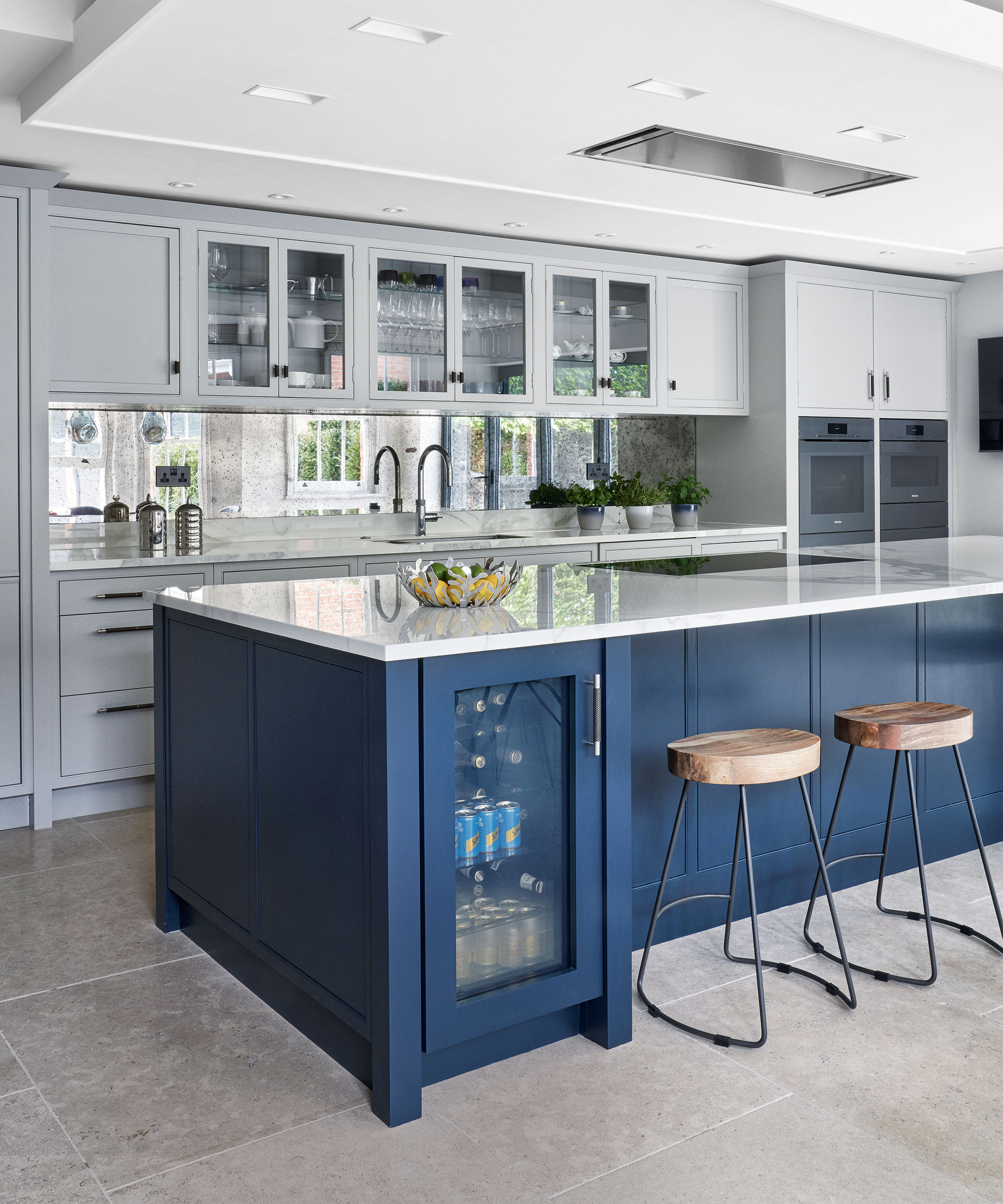
A few years ago, wine cabinets were considered a luxury appliance, available only to those with big budgets and big kitchens to match. These days, however, as prices and sizes have reduced, there’s something to suit every scheme and size.
Wine coolers built into a kitchen island are a great investment, as they will free up space in the refrigerator, as well as the worktop while keeping your wine in optimum condition.
If you enjoy entertaining, friends and family can help themselves to a glass while you get on with the cooking. As our kitchens become more like theaters, with island cooking becoming more popular, it makes sense to have a wine cabinet to complete the performance.
21. Add texture with paneling
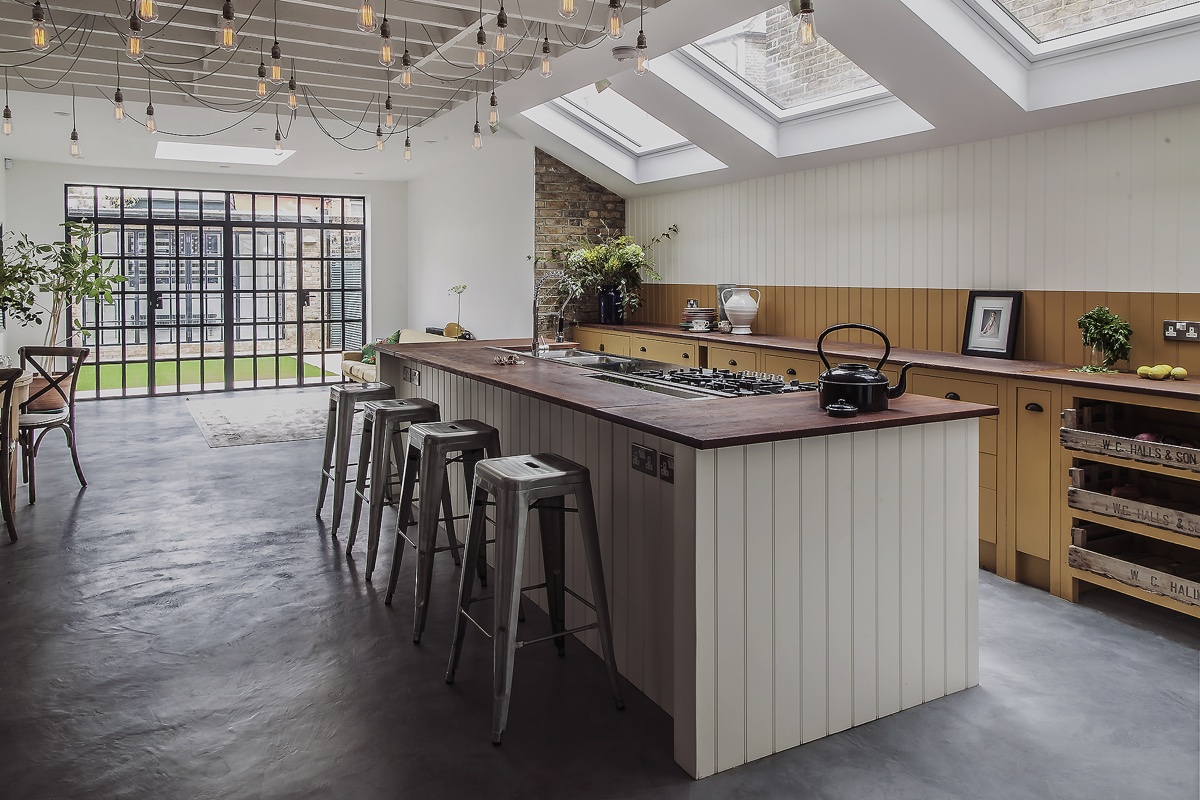
Depending on the interior design style you've chosen in your kitchen, paneling can add an interesting design detail to an island. For more traditional kitchen ideas, tongue and groove paneling will feel right at home.
'The long-established love for tongue and groove paneling is more popular than ever. The natural design choice helps to add a tactile and warm feel when used on kitchen island ideas,' says Merlin Wright at Plain English.
This kitchen features tongue and groove paneling on the island as well as the back wall, so to create a visual divide, different paint colors have been used. The green hue on the island feels more rustic and offers a nod to the countryside surroundings.
If you love workstations and breakfast bars with a rural flavor, dive into our farmhouse kitchen island ideas, too.
22. Use a floating effect for extra interest
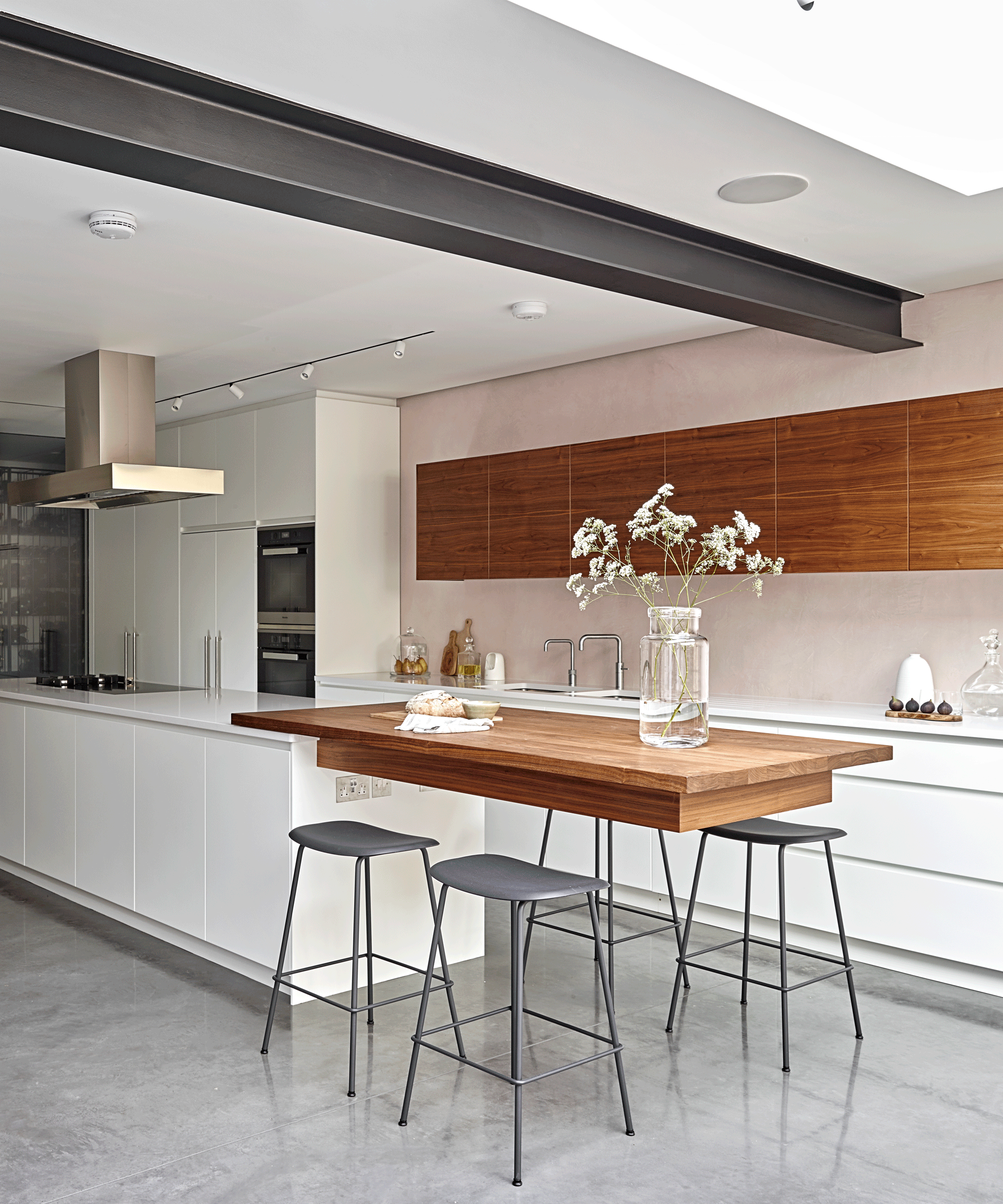
Designing a long, narrow kitchen means sometimes you have to get creative with layouts and design details. If making space for an island and a dining area is important for you, try introducing a floating table at the end of your island.
This island conceived by Forbes Rix Design features a cantilevered bar in solid walnut, maximizing space while introducing a wow factor the the space. ‘The floating effect was achieved using a steel box frame structure that was concealed under the countertop and between the cabinets, then bolted to the concrete floor,’ explains Andrew Hall, director, Woodstock Furniture.
‘Not only is it guaranteed to impress, but it also leaves more flooring visible, which boosts the sense of space,' he adds.
23. Add tiles to a kitchen island
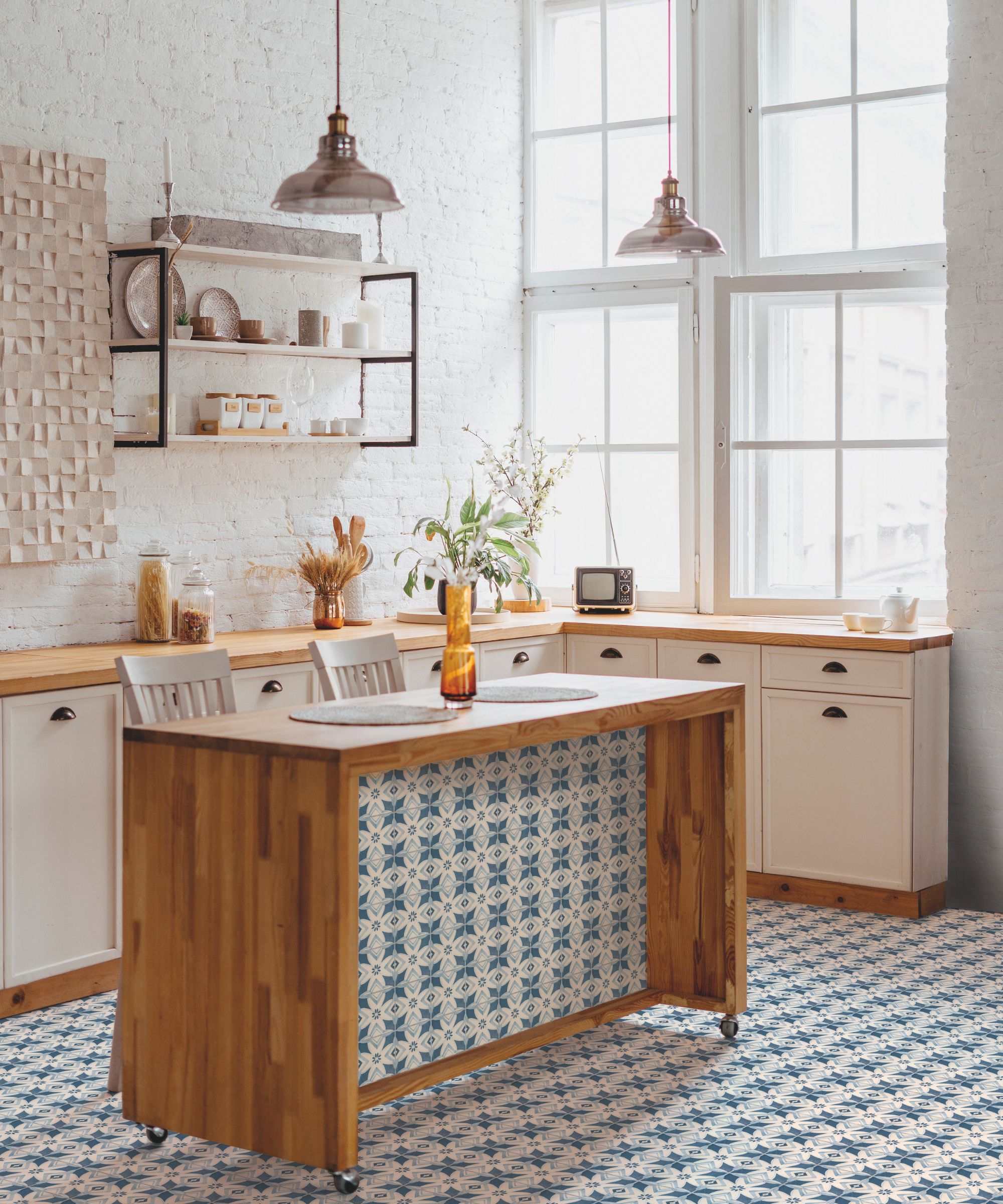
Tiles are a staple in kitchen design, so why not add them to a kitchen island? Not only are they incredibly durable, but they offer a simple solution to adding interest to your space.
'Tiles can be a great way of adding color and texture to a kitchen island. They can make a relatively standard kitchen island ‘pop’ and instantly become the main focal point of the kitchen. There is also the added bonus that they are easy to clean and wipe down, so if used cleverly in areas where your feet might brush against the kitchen island, it helps to keep it looking new, without having to worry about scuff marks,' says Grazziella Wilson, head of creative at Ca' Pietra.
'A great tip to help tie your island into the rest of the kitchen is to use the same tiles as your backsplash. This can help to bring extra color and pattern, but also make the kitchen work as one,' she adds.
24. Work with your home's existing fabric
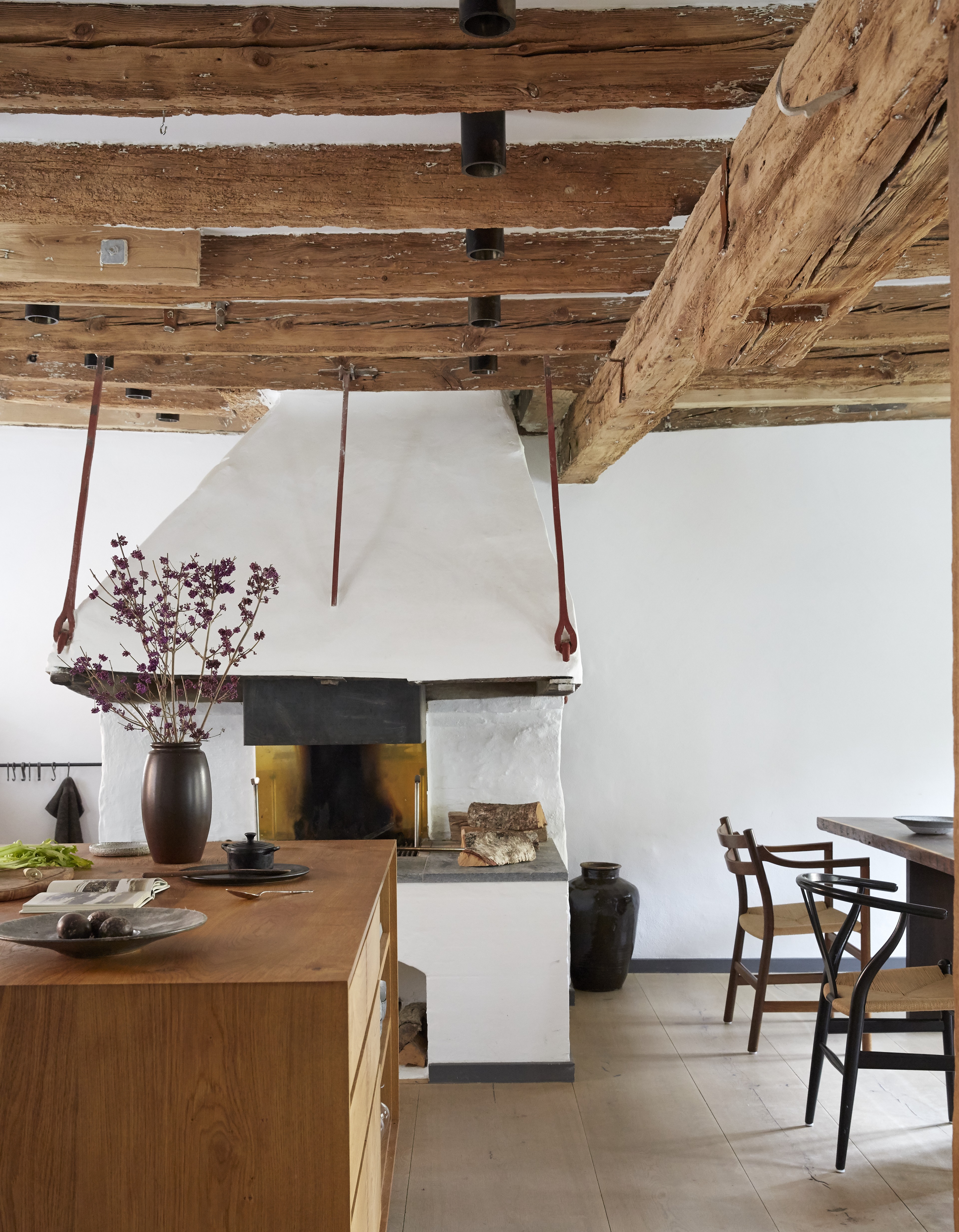
Working with the bones of your home is key to making a kitchen feel cohesive with its surroundings. A kitchen island is a good place to do this – whether your kitchen features exposed wooden beams or an original marble fireplace, working in tangent with these pieces will make a big difference to the finished scheme.
In this cottage kitchen, rustic wooden beams are a main feature in the kitchen, so to tie them into the scheme, a wooden kitchen island has been introduced. This automatically makes the island feel in keeping with the home's architecture and makes the beams feel part of the scheme rather than something to work around.
However, it's important to remember that adding at least one element of contrast into the room is key – here, the rough plaster of the white walls offers the relief.
25. Lean into a moody scheme
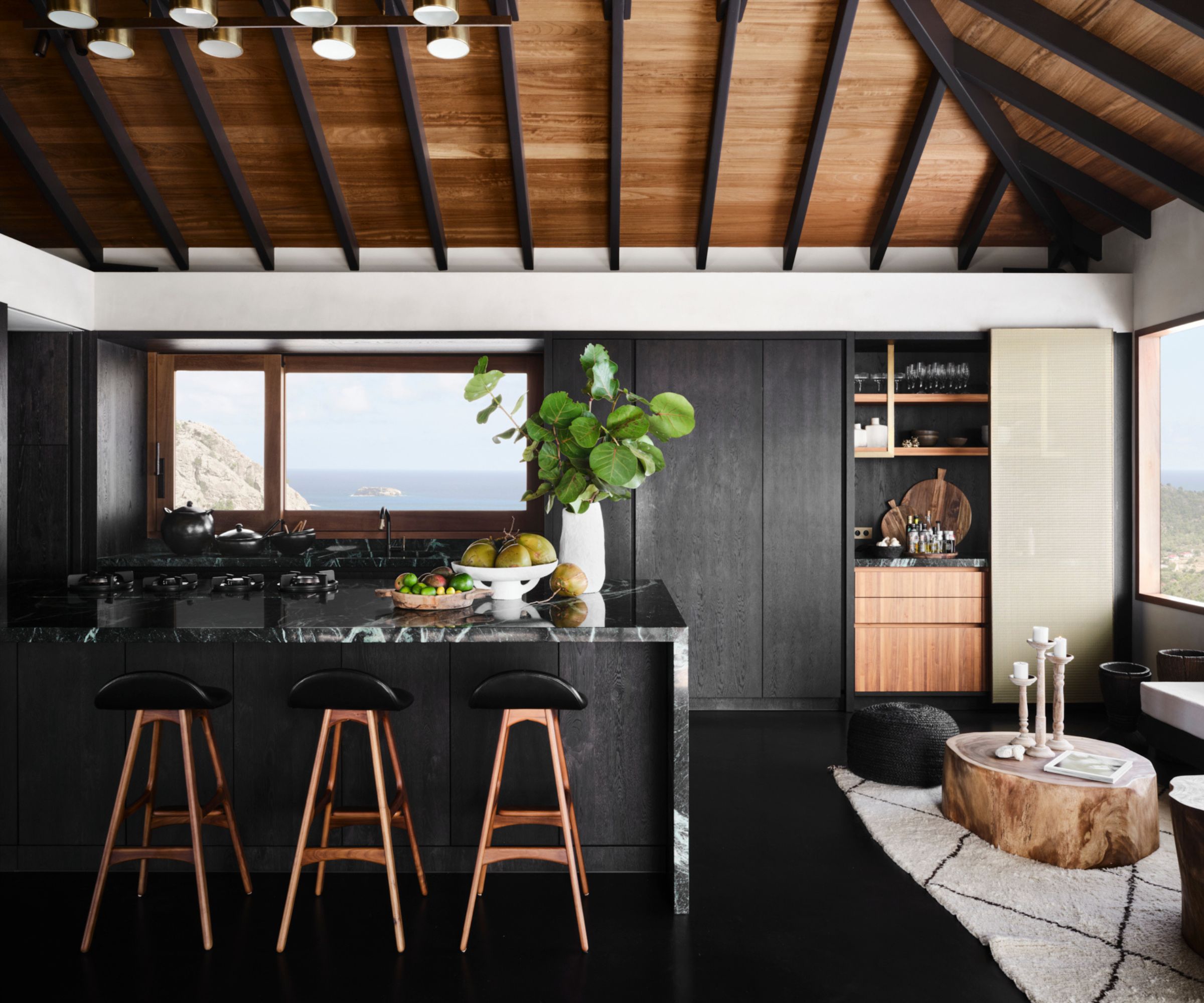
Decorating with a moody color palette can seem intimidating, but it can create an elegant kitchen when done right. Painting a kitchen island black and topping it with a statement marble countertop makes for a chic feature.
'The kitchen in our Ohana, Saint Barths Villa project is meant to be extremely elegant and dramatic, but hard-working, too, as the home is quite a haven for entertaining,' explains interior designer Vanessa Alexander.
'We veered away from the usual – although beautiful – palette of island homes into a much moodier darker tone with deep green marble black accents and hand-worked brass to give an elevated elegance that also reflected the edge and spirit of the client,' she adds.
26. Introduce a butchers block island
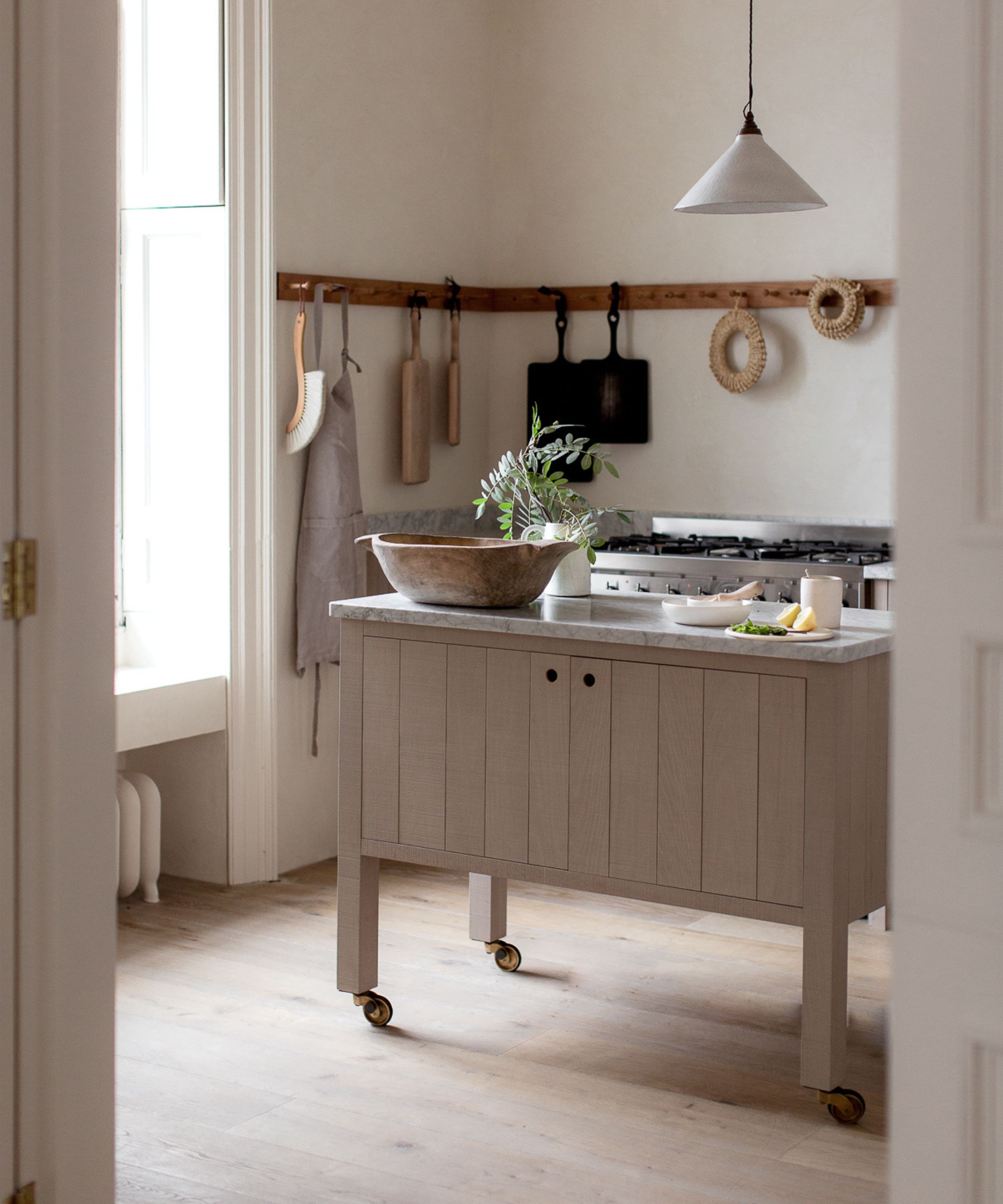
If you're working with a small kitchen, you might not have space for a traditional kitchen island. In this case, a butchers block is a great solution. Smaller than a built-in island and giving you the option of making it portable, it's a versatile solution to a more compact space.
'Back when deVOL began we were very much in favor of butcher's blocks – you could always squeeze one into most kitchens, even if you didn’t have the room for an island or prep table. We put chunky castors on the legs so you could wheel these little prep tables around the kitchen,' says Helen Parker.
'Over the years butcher's blocks have often been replaced with small islands and we are so pleased to see them making a comeback. There is something really quite pleasing about a moveable piece of furniture, it gives you options, different options depending on the situation. Don’t underestimate the usefulness and pleasure of this delightful kitchen classic and how it can be your trusty (and very pretty) best friend,' she adds.
Kitchen island ideas come in all, shapes, sizes, and styles – it's all about choosing the right design for your space. Consider how it fits into your scheme as well as how it works with the flow of your space – as long as it nails both style and function, a kitchen island can really elevate your kitchen scheme.

Jennifer is the Digital Editor at Homes & Gardens, bringing years of interiors experience across the US and UK. She has worked with leading publications, blending expertise in PR, marketing, social media, commercial strategy, and e-commerce. Jennifer has covered every corner of the home – curating projects from top interior designers, sourcing celebrity properties, reviewing appliances, and delivering timely news. Now, she channels her digital skills into shaping the world’s leading interiors website.
- Busola EvansContributing Editor
- Molly MalsomKitchens & Bathrooms Editor
- Hebe HattonHead of Interiors